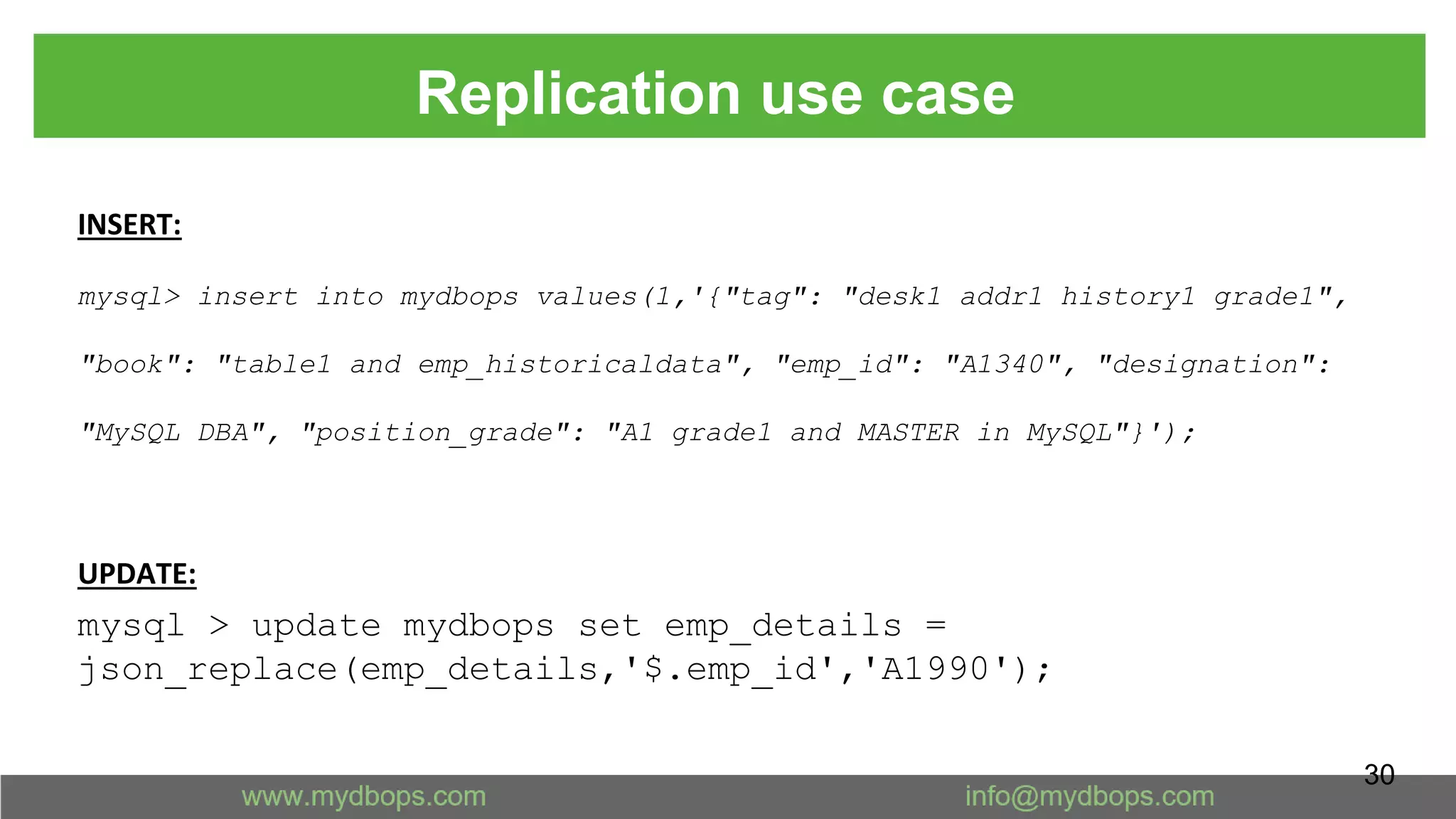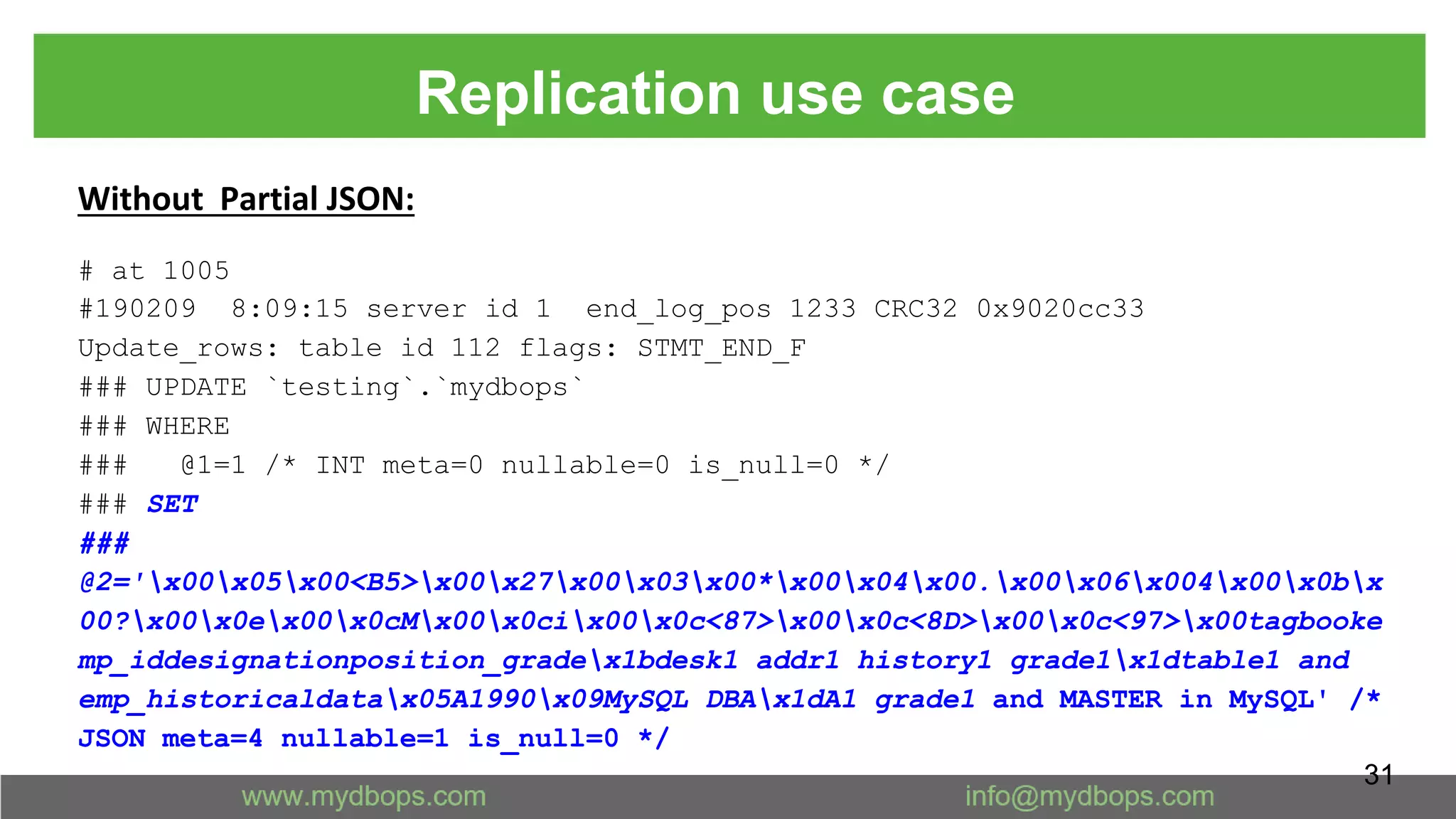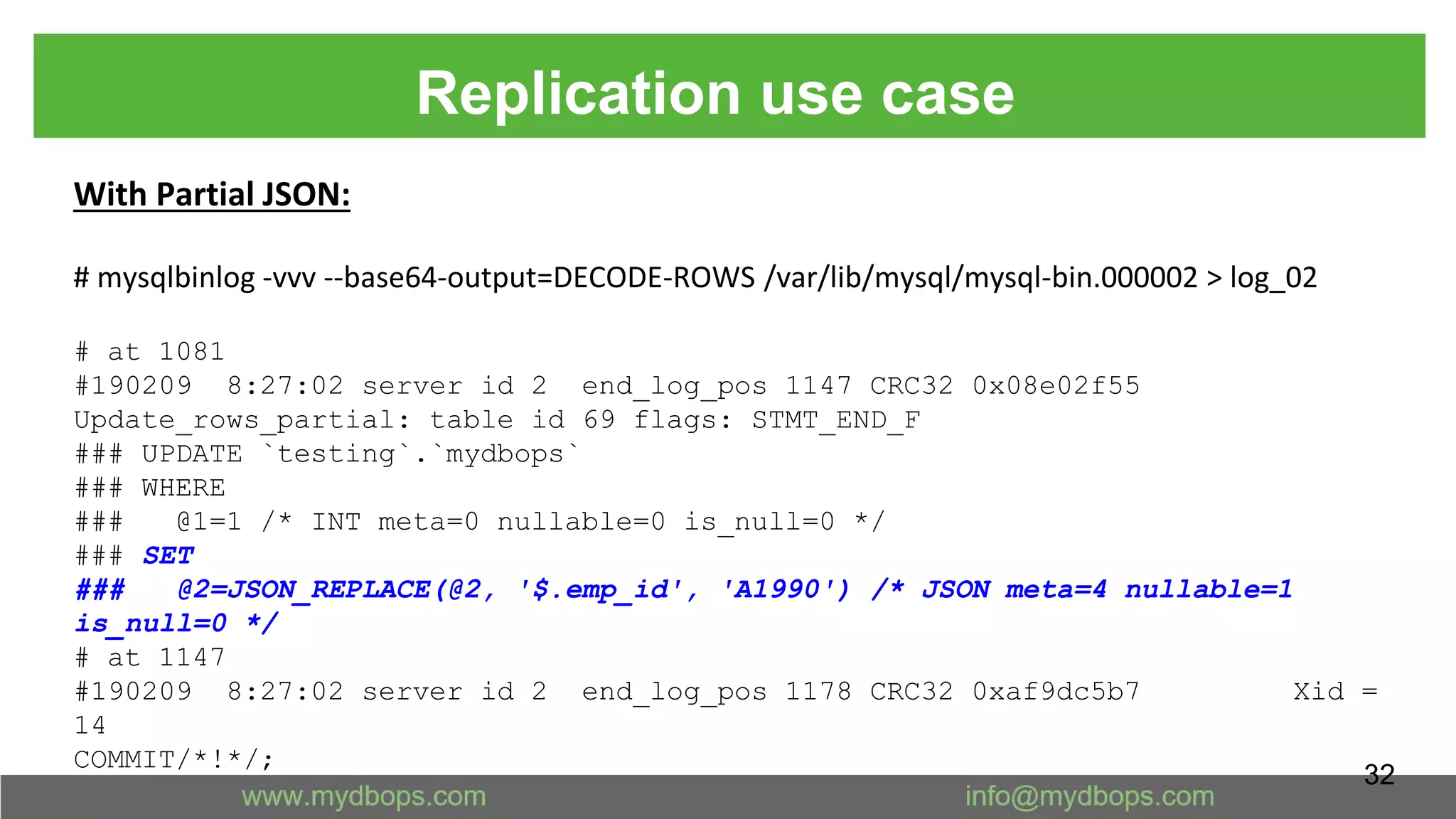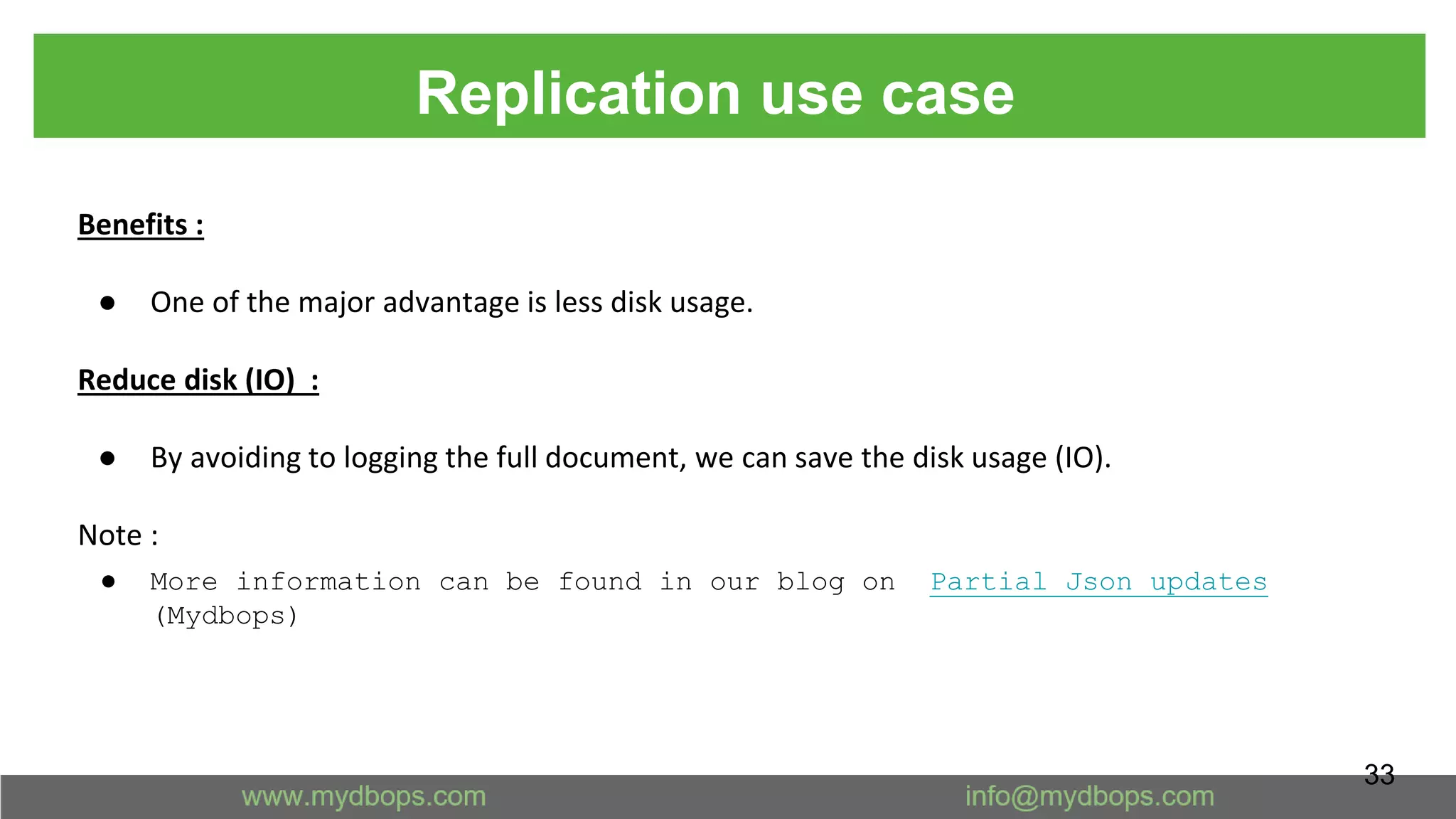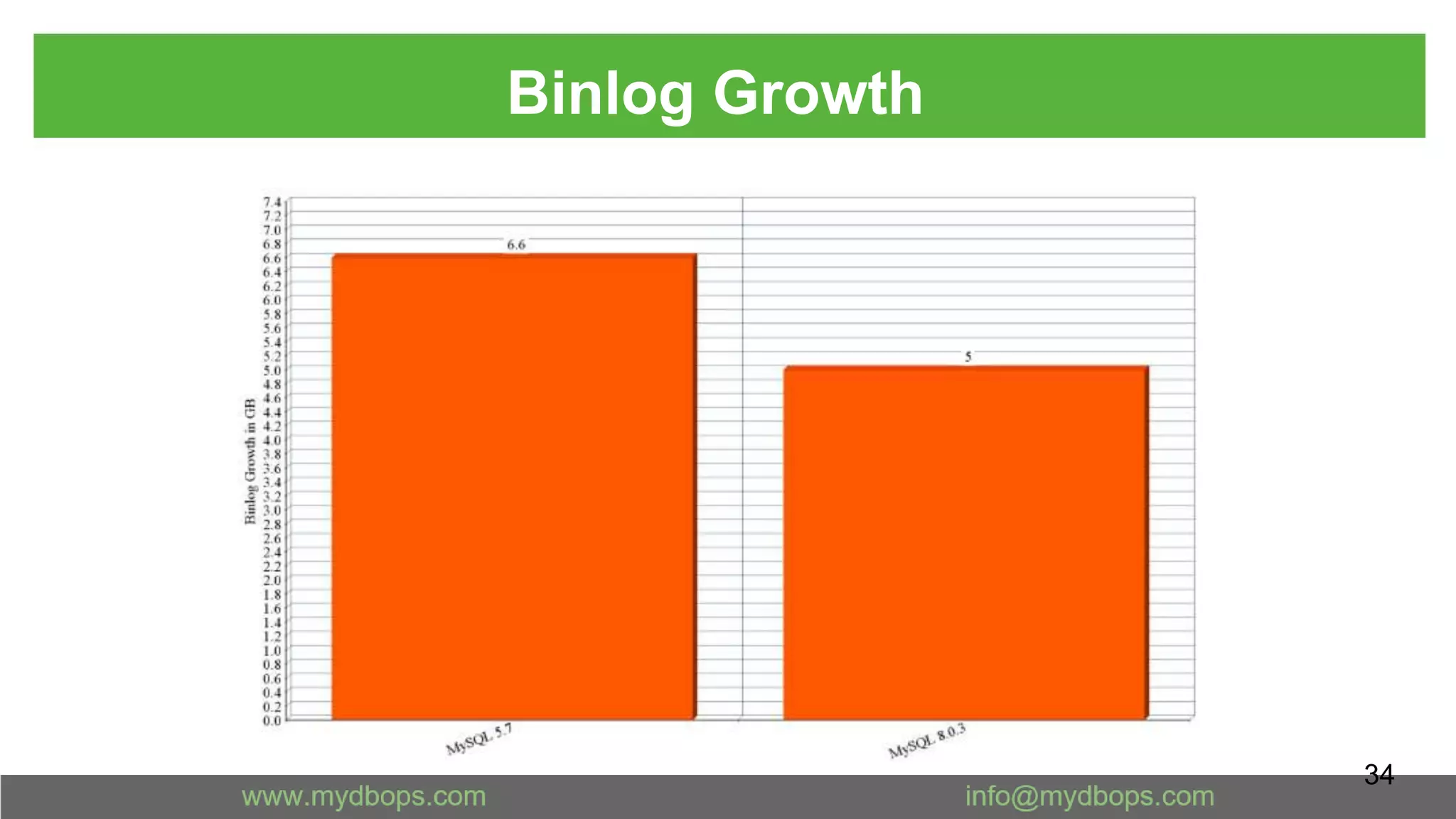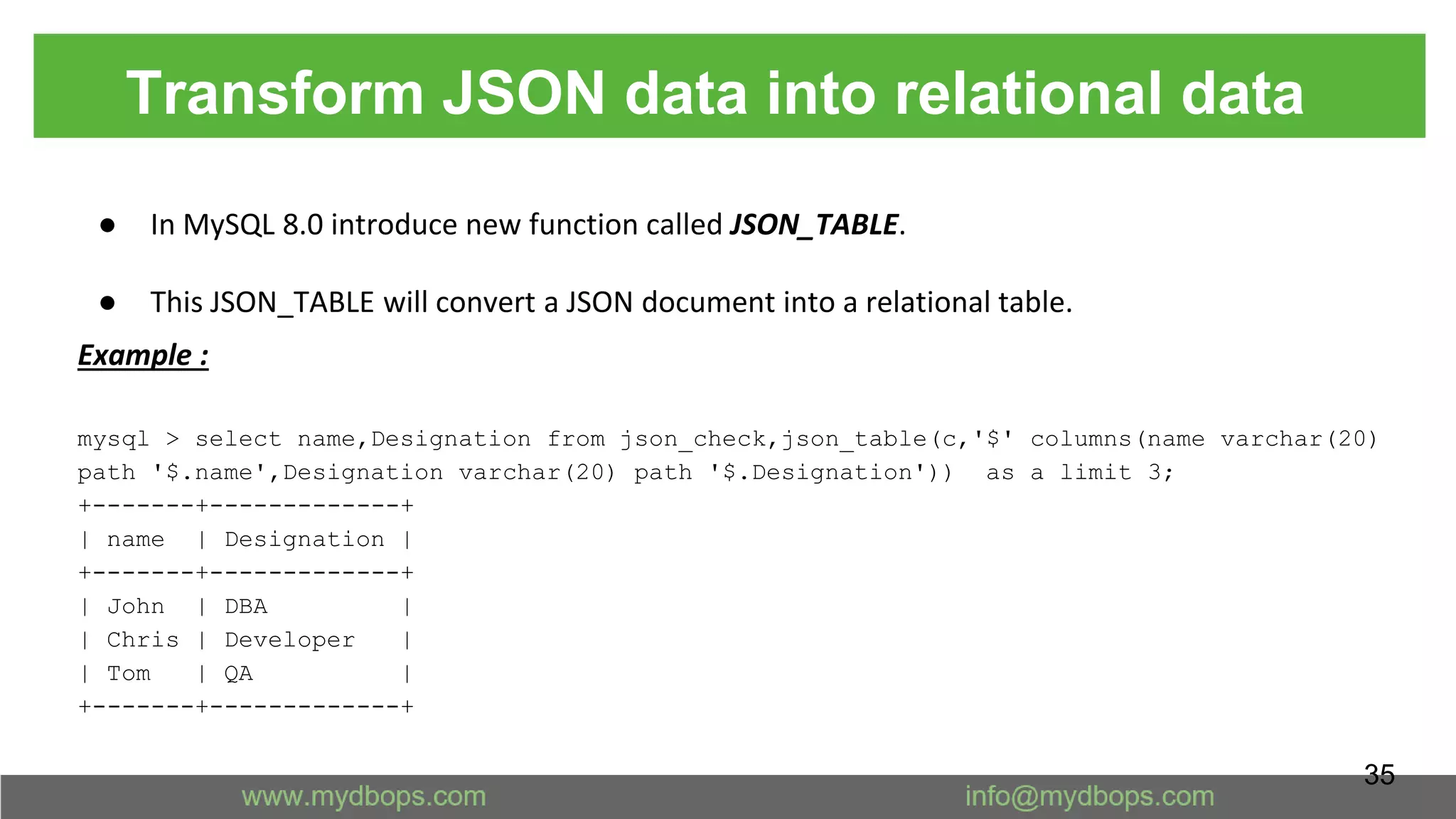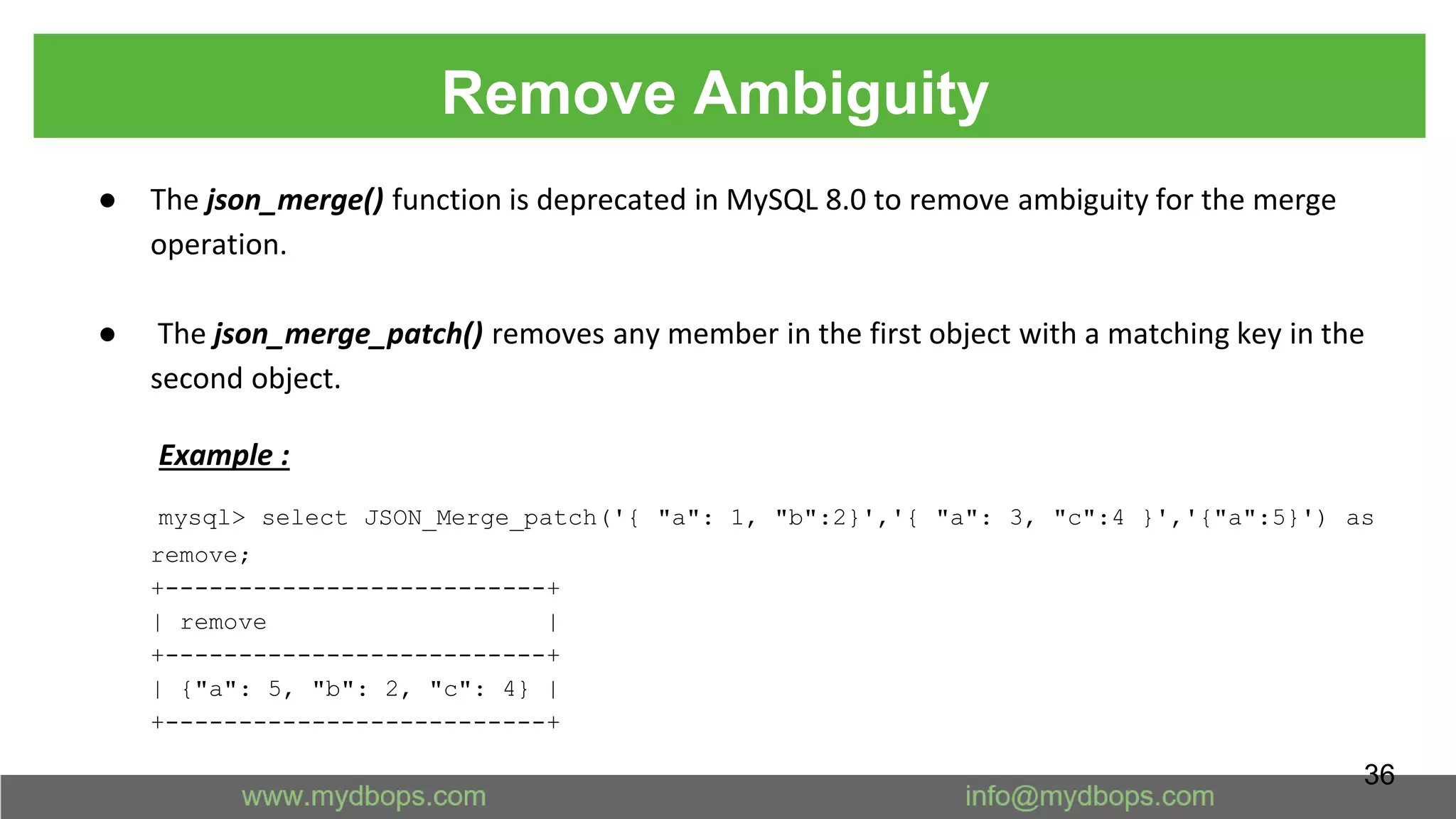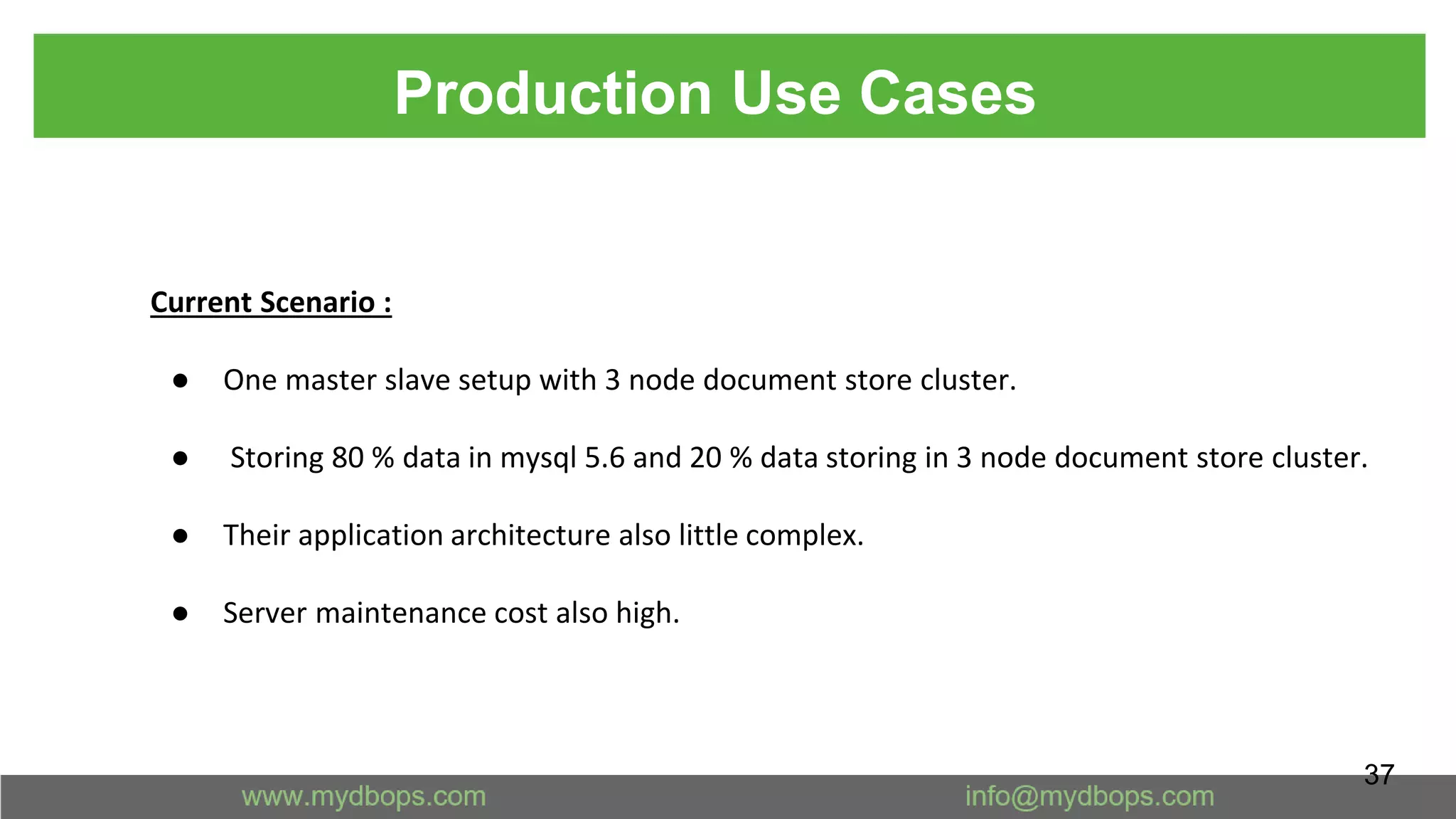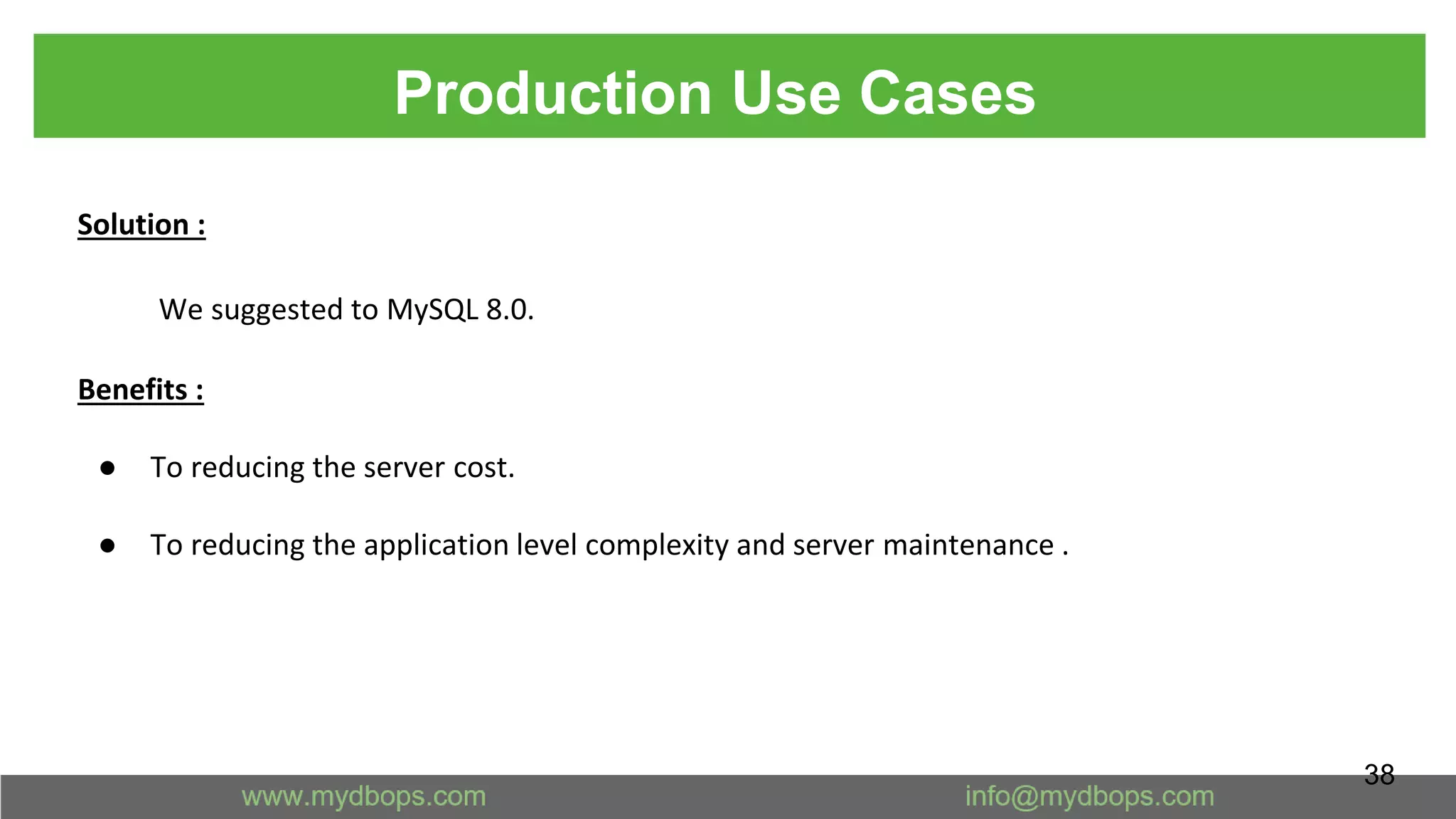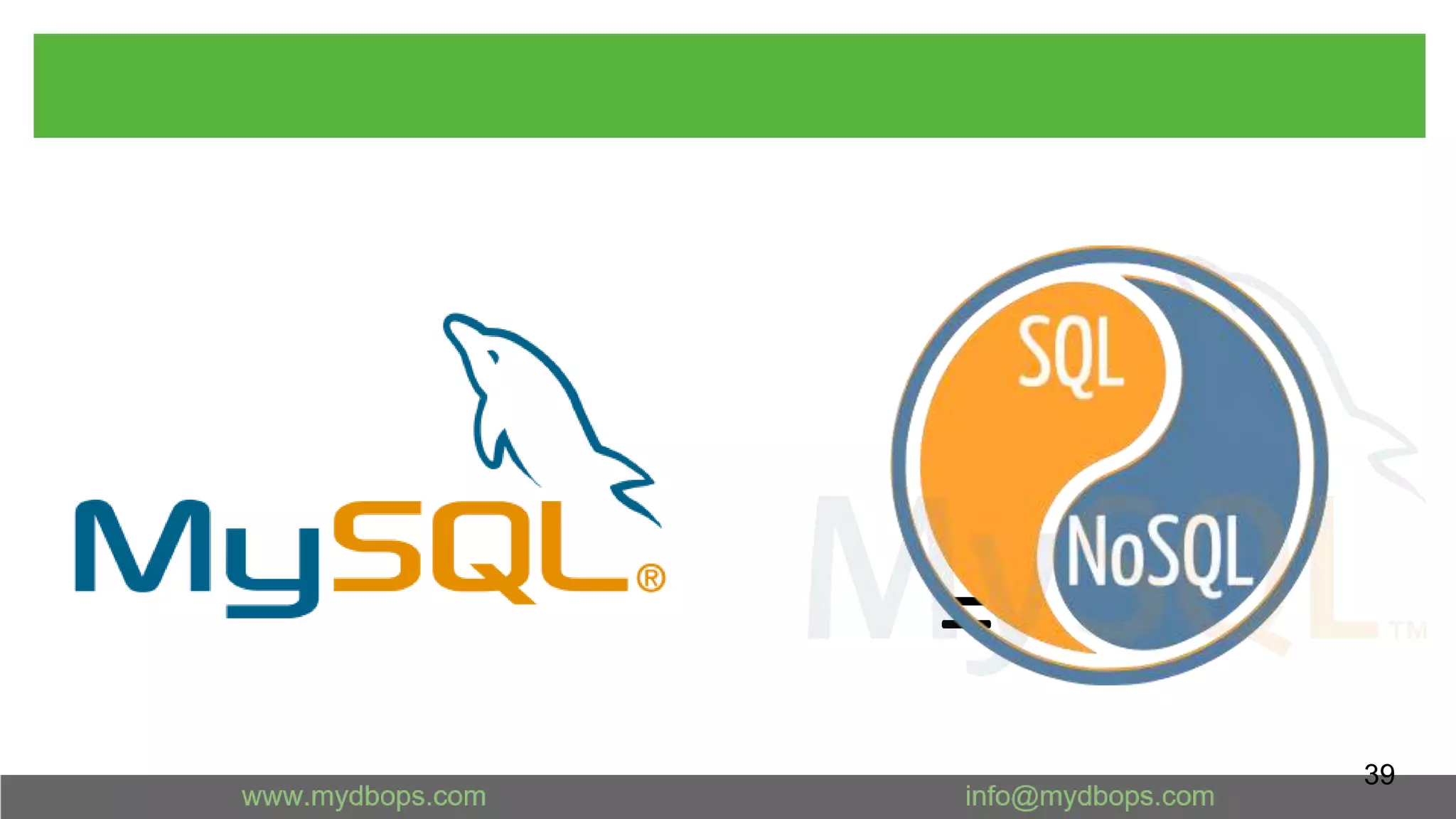The document discusses improvements in JSON functionality in MySQL 8.0 as compared to 5.7, highlighting new features, functions, and performance enhancements. It covers topics such as JSON data type introduction, manipulation functions, and the benefits of partial updates in replication scenarios. Additionally, it emphasizes the new json_table function that converts JSON documents into relational tables, improving data handling and performance.
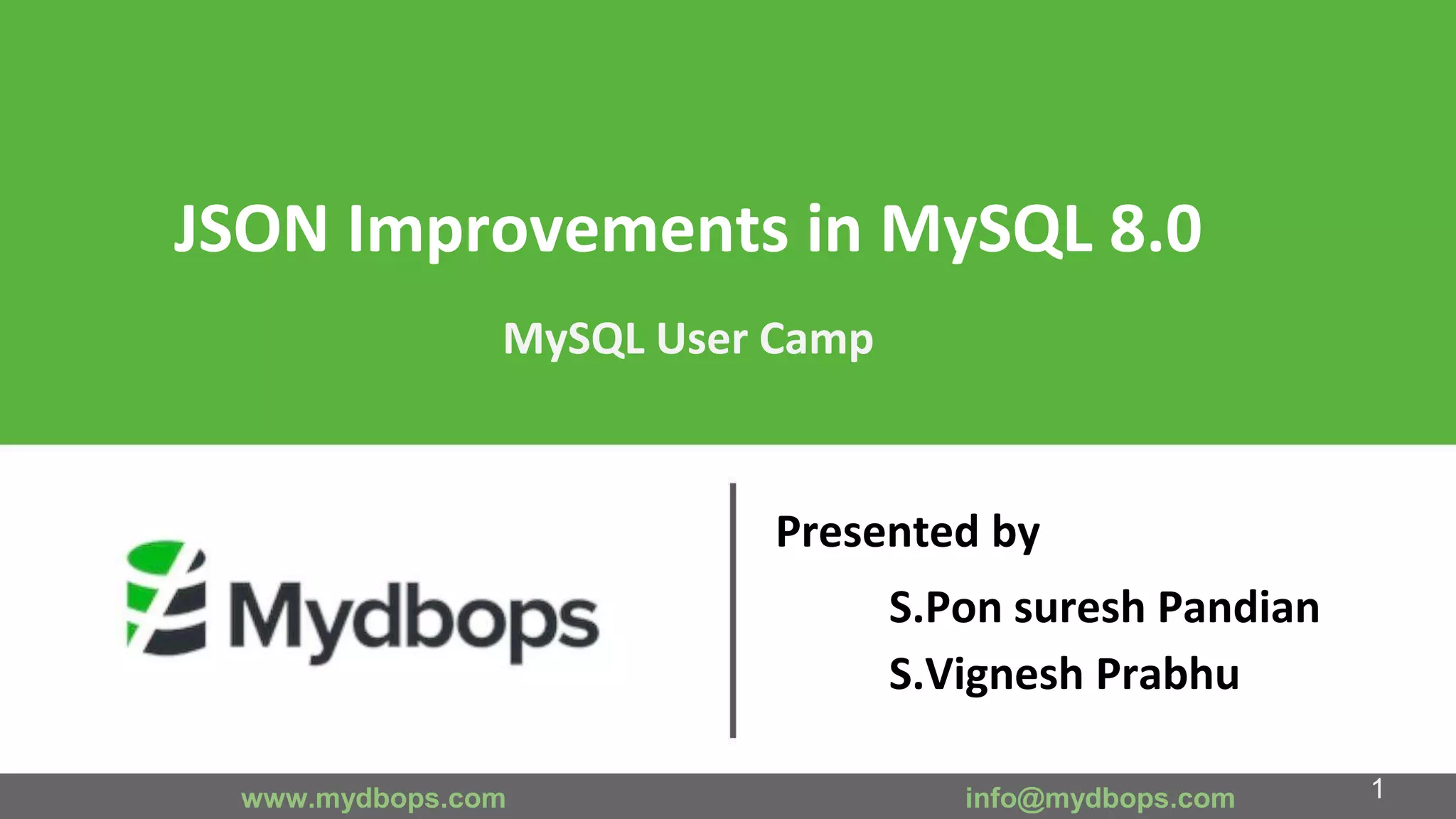
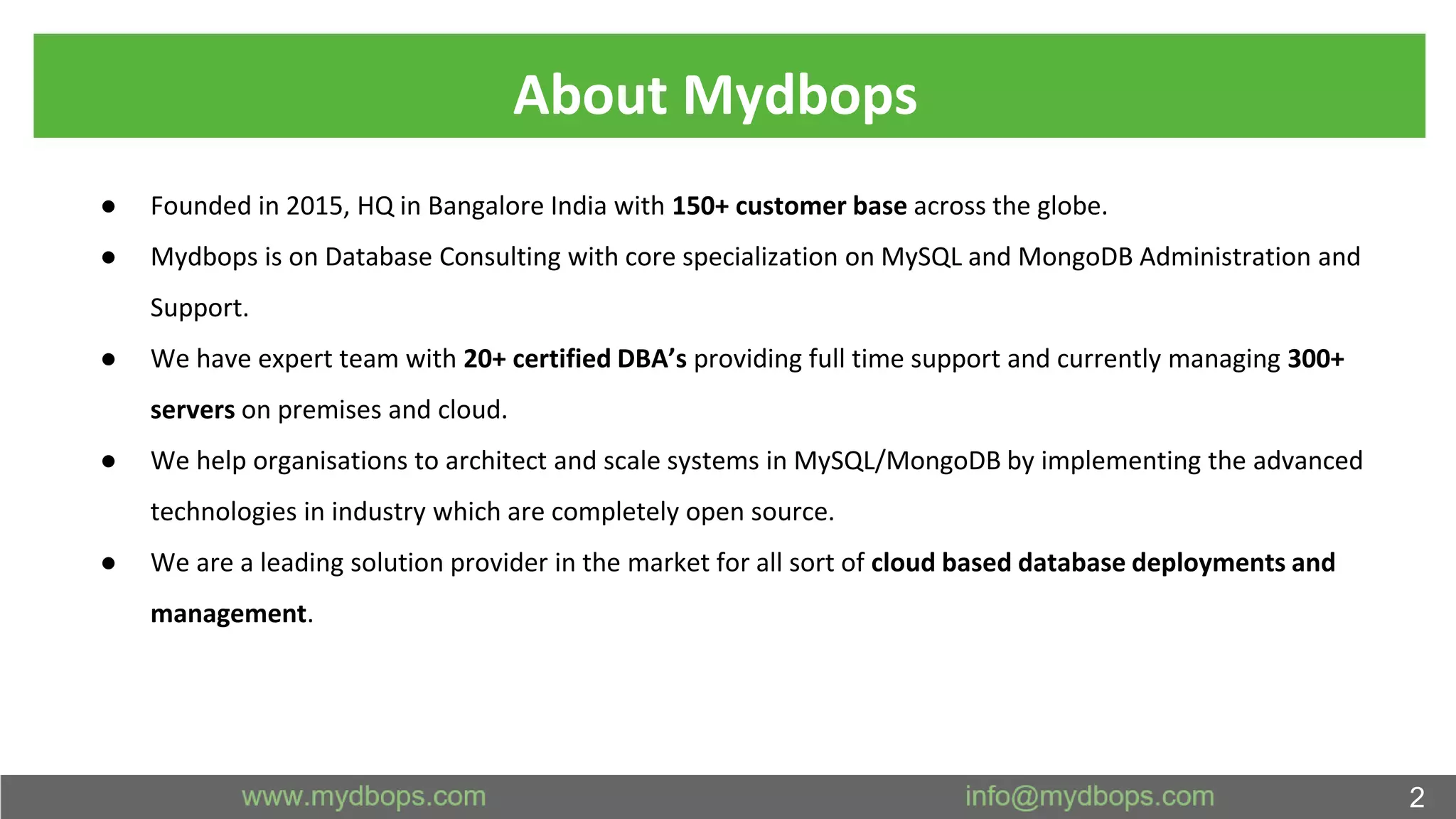
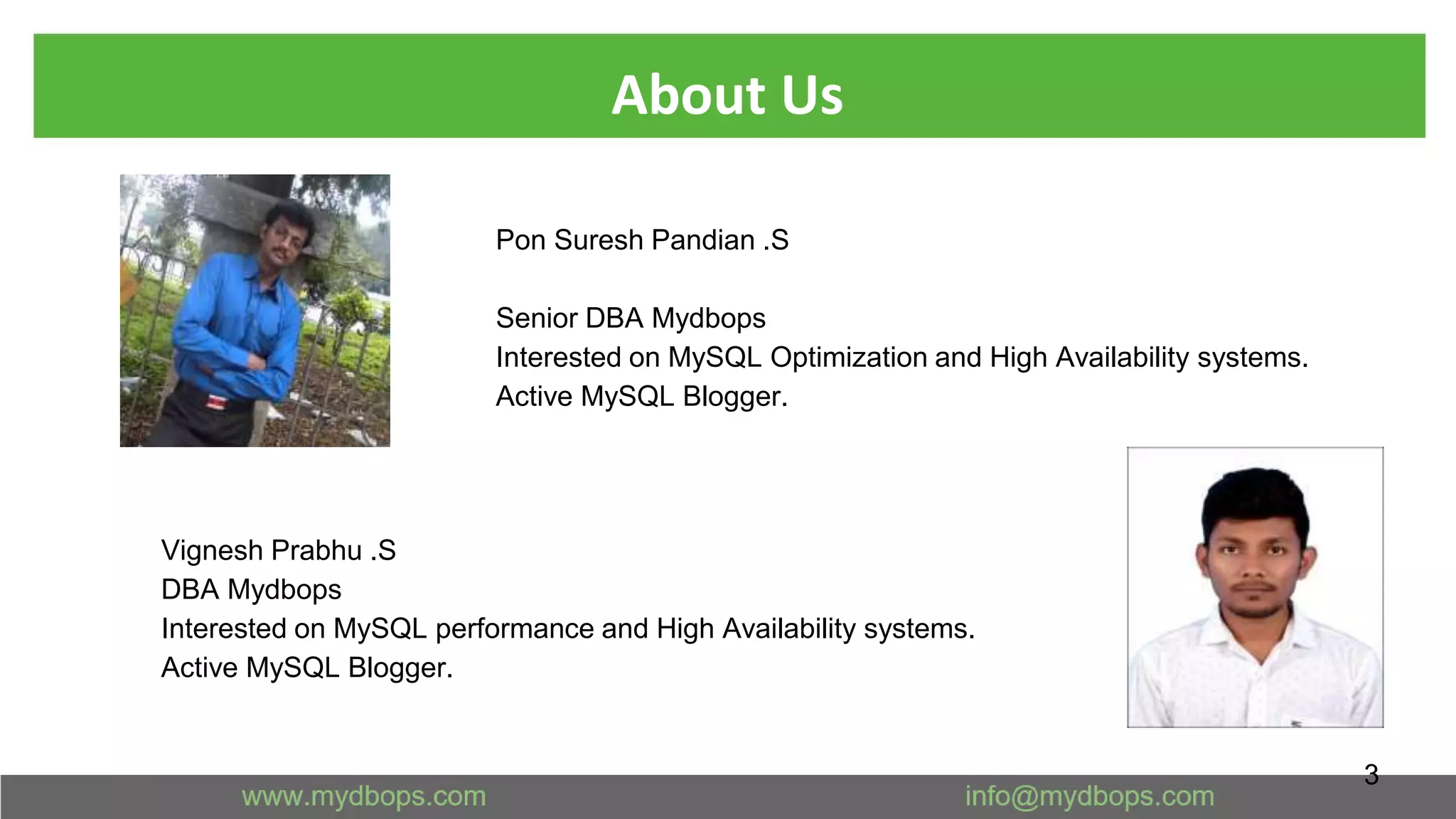
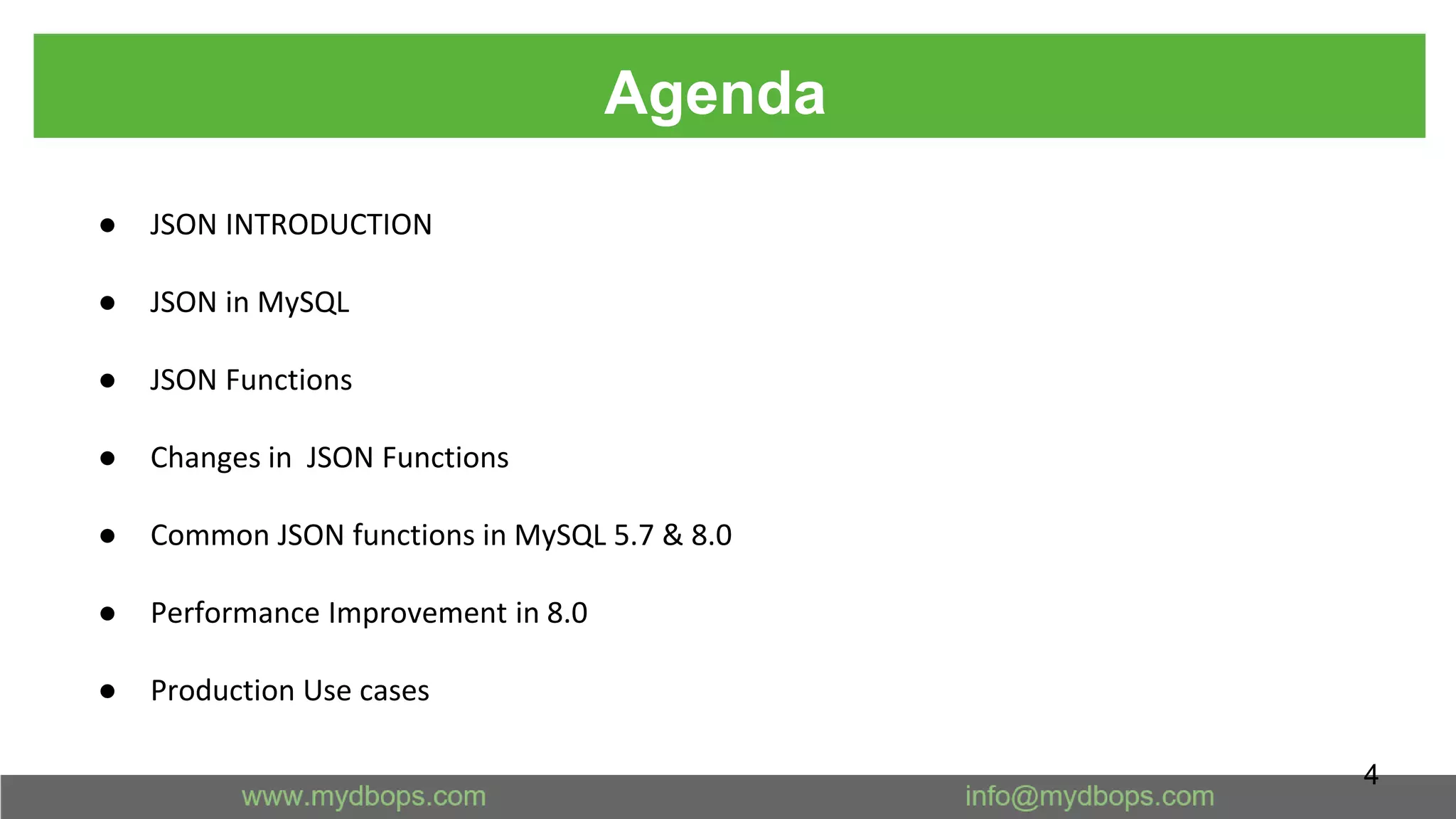
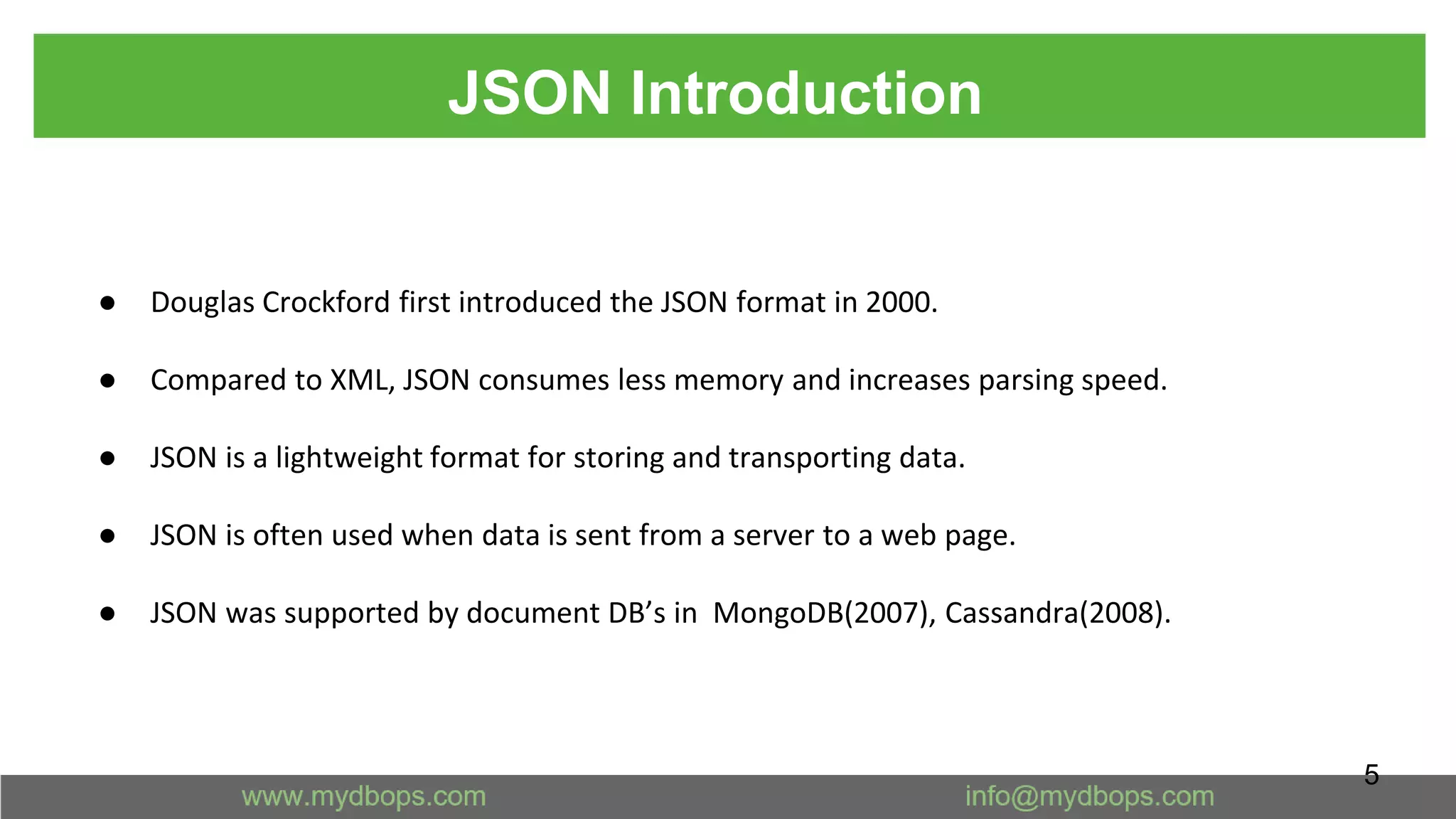
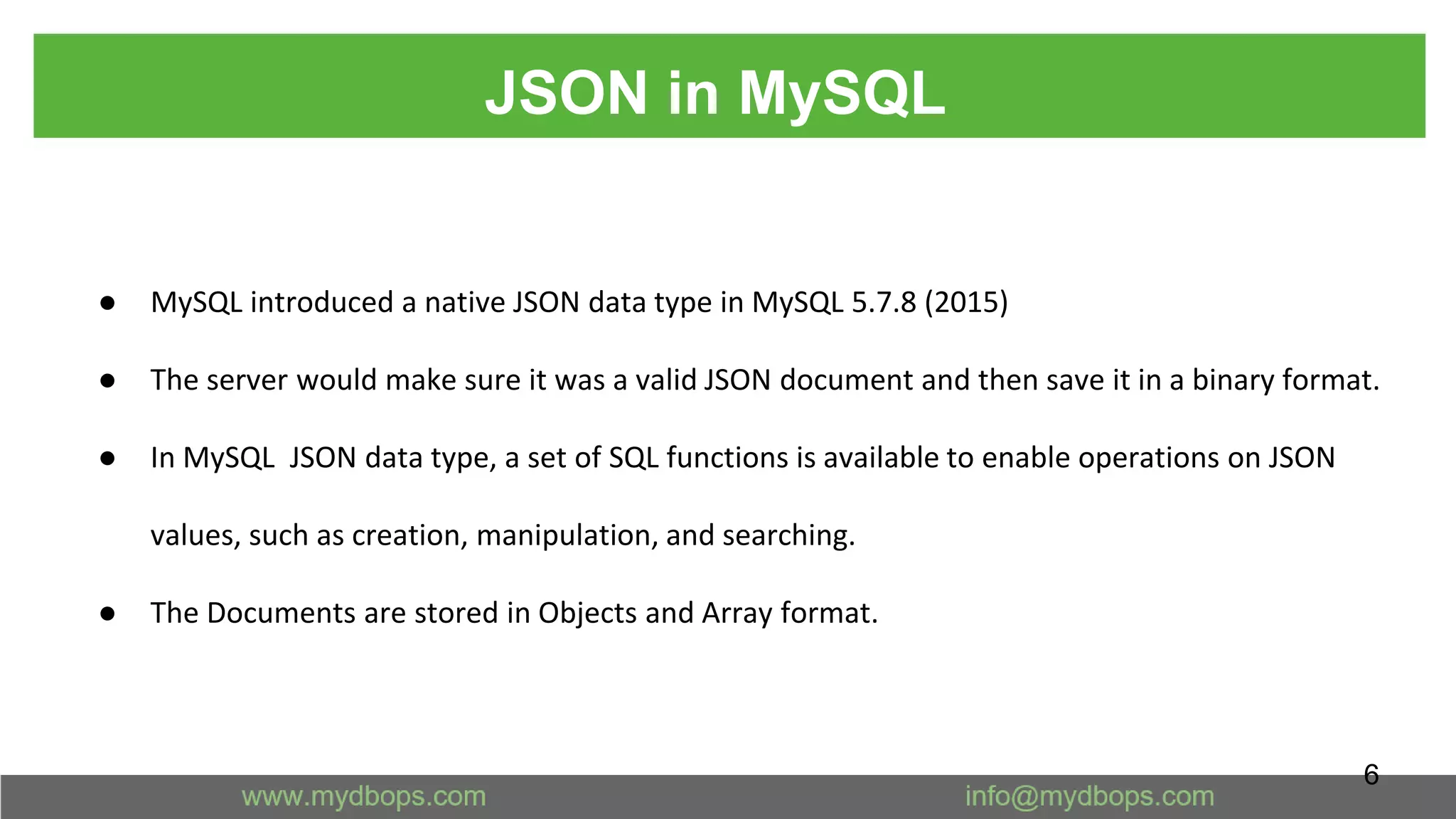
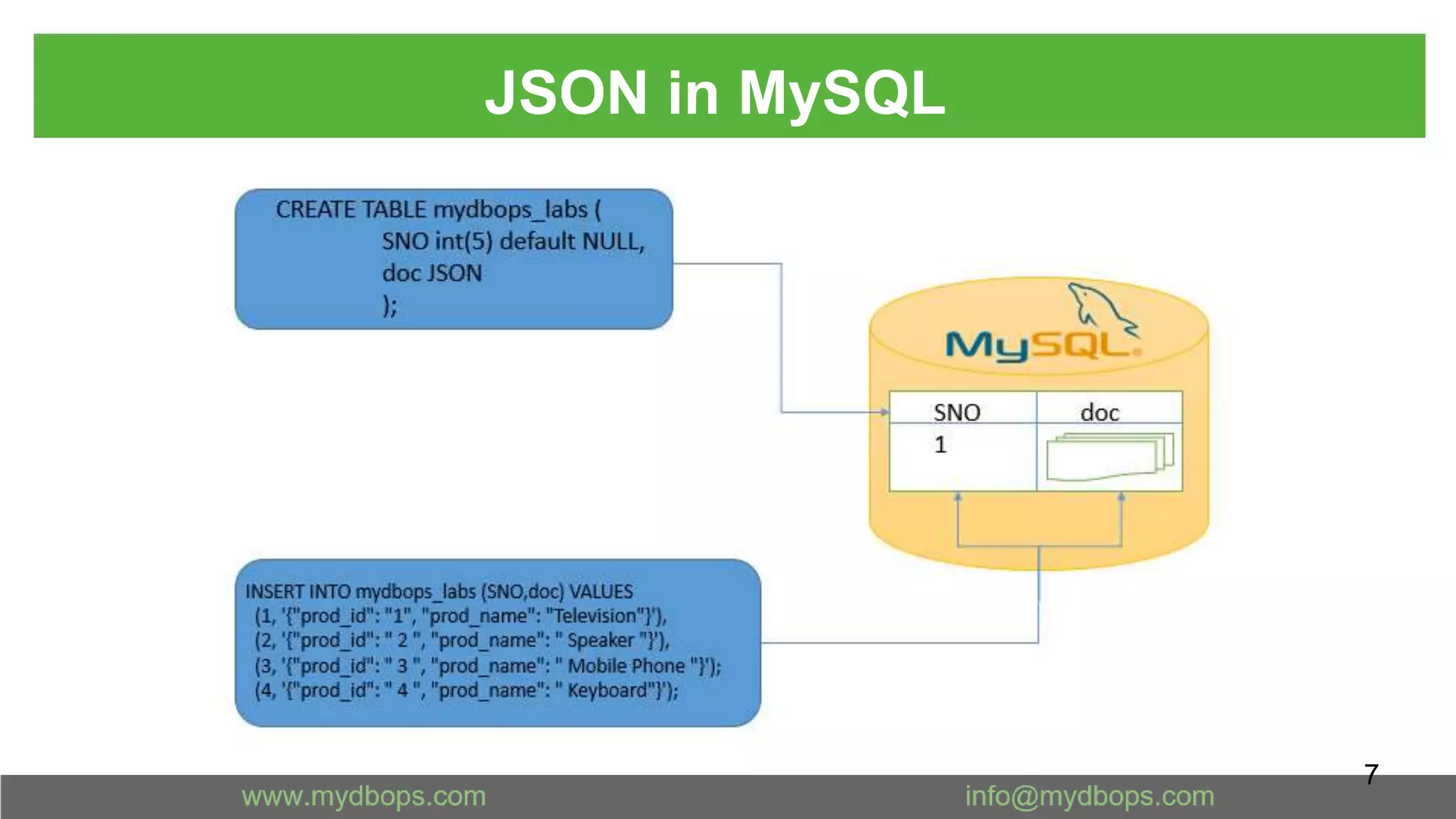
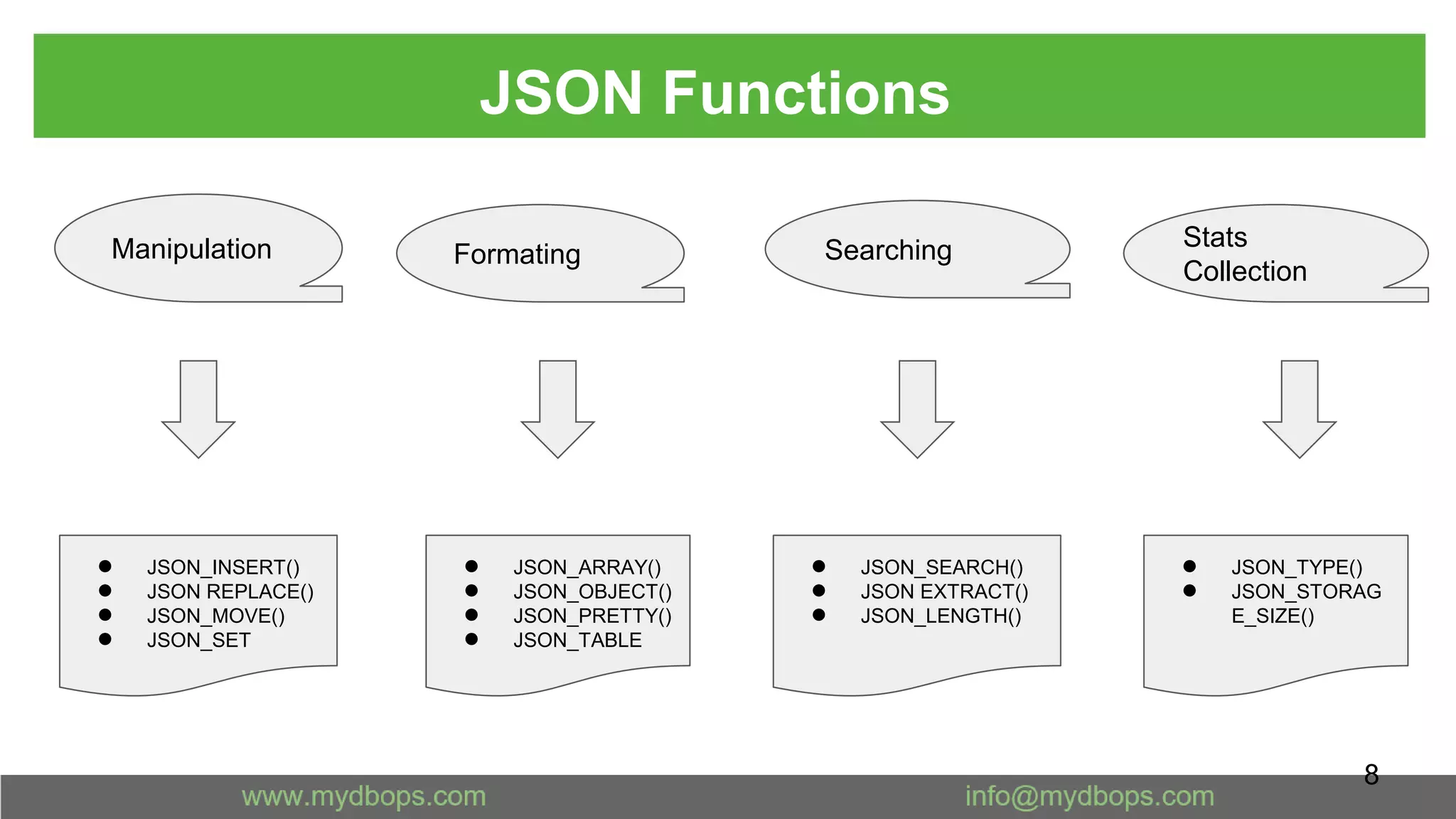
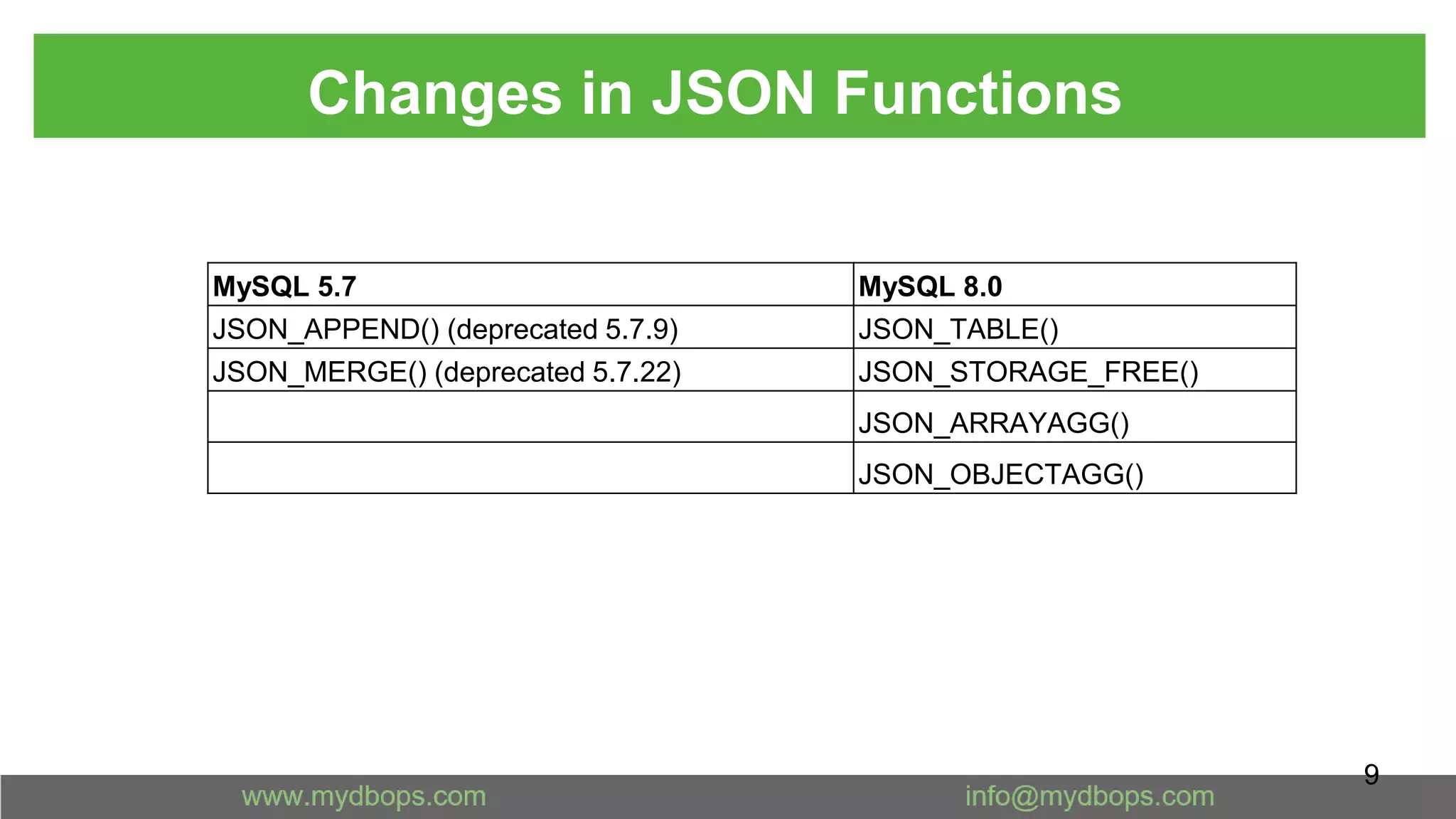
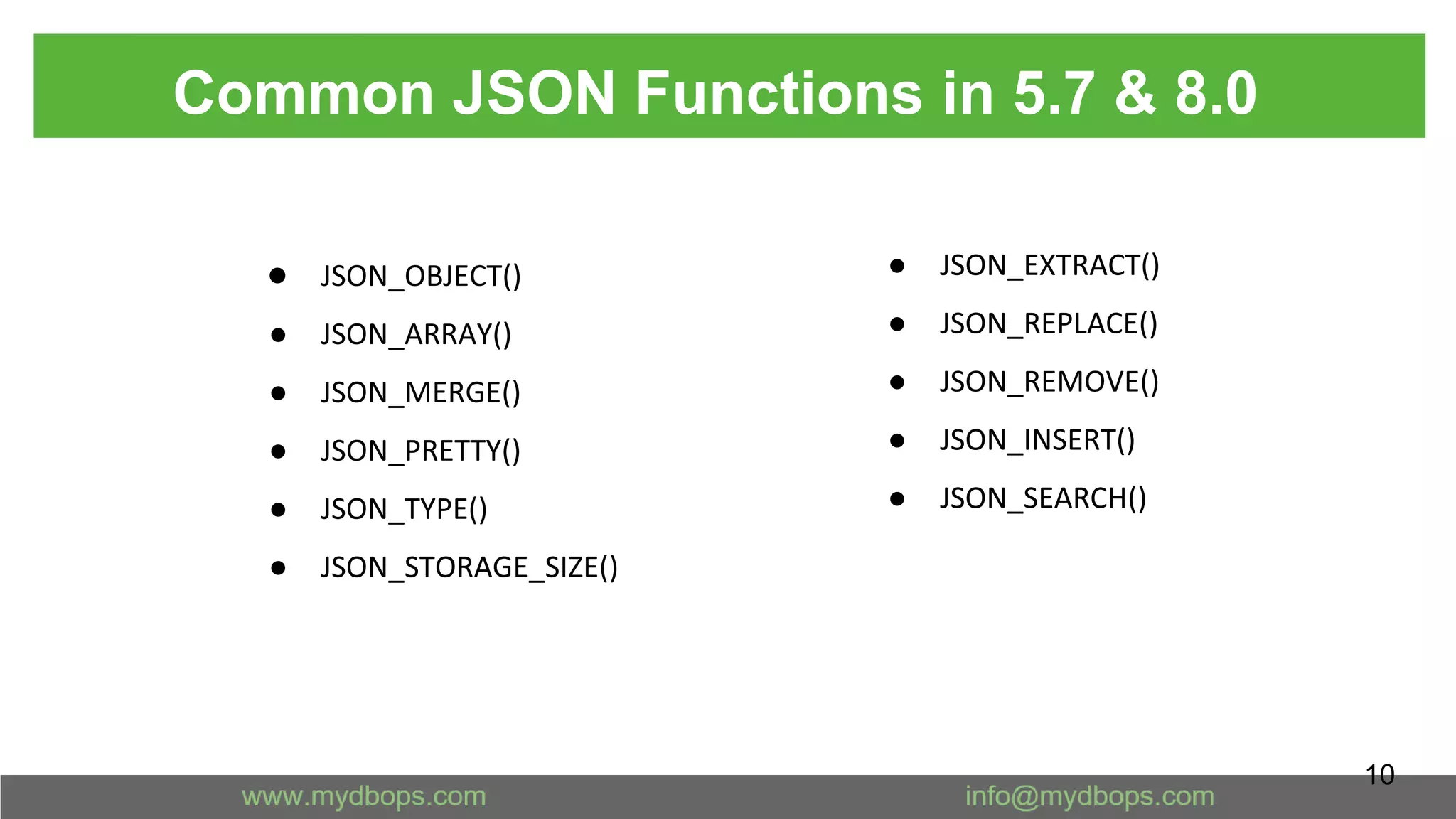
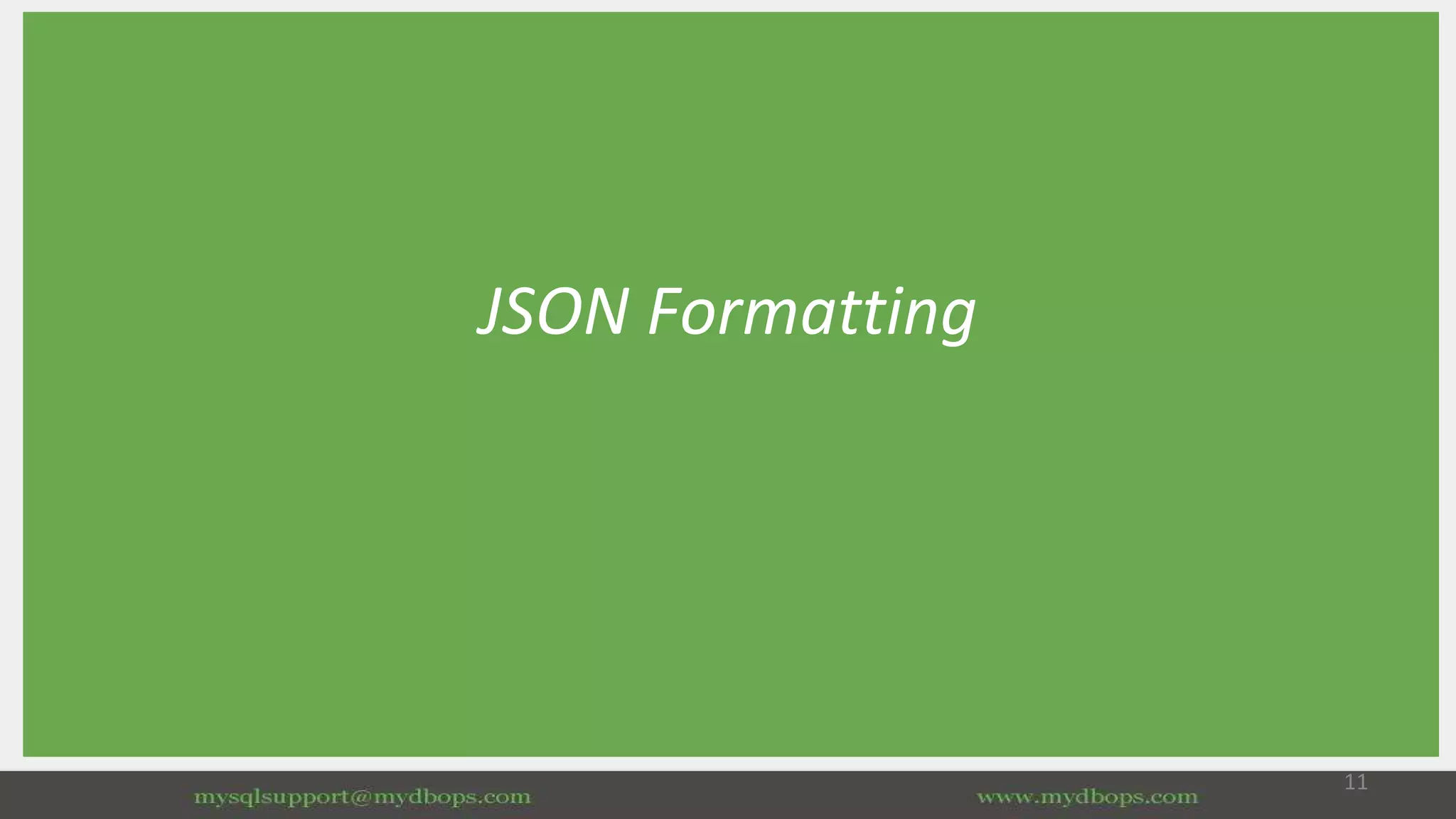
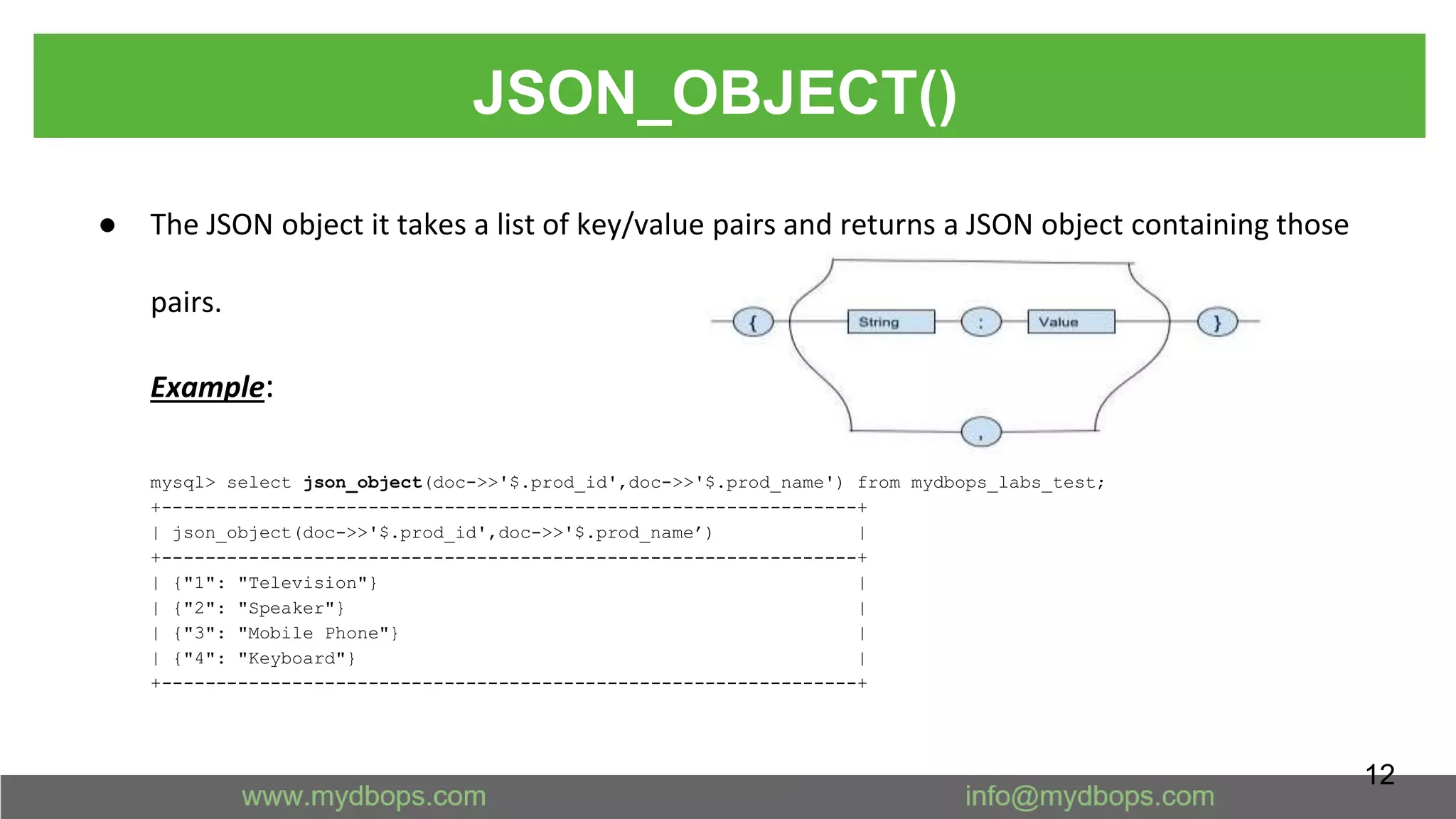
![JSON_ARRAY()
● JSON_ARRAY() will convert the given elements into the array structured format.
Example:
mysql> select json_array(doc) from mydbops_labs_test;
+-------------------------------------------------+
| json_array(json_text) |
+-------------------------------------------------+
| [{"prod_id": "1", "prod_name": "Television"}] |
| [{"prod_id": "2", "prod_name": "Speaker"}] |
| [{"prod_id": "3", "prod_name": "Mobile Phone"}] |
| [{"prod_id": "4", "prod_name": "Keyboard"}] |
+-------------------------------------------------+
● By default, JSON will deliver the result in the Array format only.
13](https://image.slidesharecdn.com/jsonimprovementsinmysql8-190226114716/75/JSON-improvements-in-MySQL-8-0-13-2048.jpg)
![JSON_MERGE()
● Merge the Array and Object contents and returns the output in array format.
● It’s simply like concat operation.
● Json_merge() = [ array_elements + {object} ].
● This function is removed in MySQL 8.0.3
mysql> select doc1, doc, json_merge(doc1,doc) from mydbops_labs_test1;
+-----------------------+-----------------------------------------------+---------------------------------------------------------------------+
| doc1 | doc | json_merge(doc1,doc) |
| | | |
+-----------------------+-----------------------------------------------+---------------------------------------------------------------------+
| [1, "First Product"] | {"prod_id": "1", "prod_name": "Television"} | [1, "First Product", {"prod_id": "1", "prod_name": "Television"}] |
| [2, "Second Product"] | {"prod_id": "2", "prod_name": "Speaker"} | [2, "Second Product", {"prod_id": "2", "prod_name": "Speaker"}] |
| [3, "Third Product"] | {"prod_id": "3", "prod_name": "Mobile Phone"} | [3, "Third Product", {"prod_id": "3", "prod_name": "Mobile Phone"}] |
| [4, "Fourth Product"] | {"prod_id": "4", "prod_name": "Keyboard"} | [4, "Fourth Product", {"prod_id": "4", "prod_name": "Keyboard"}] |
+-----------------------+-----------------------------------------------+---------------------------------------------------------------------+
14](https://image.slidesharecdn.com/jsonimprovementsinmysql8-190226114716/75/JSON-improvements-in-MySQL-8-0-14-2048.jpg)
![JSON_PRETTY()
● Displays the Json values in pretty format. Easy to read
mysql> select json_pretty(doc) from mydbops_test limit 2;
+---------------------------------------------------------------------------------------+
| json_pretty(doc) |
+---------------------------------------------------------------------------------------+
| [
1,
"First Product",
{
"prod_id": "1",
"prod_name": "Television"
}
] |
| [
2,
"Second Product",
{
"prod_id": "2",
"prod_name": "Speaker"
}
] |
+---------------------------------------------------------------------------------------+
15](https://image.slidesharecdn.com/jsonimprovementsinmysql8-190226114716/75/JSON-improvements-in-MySQL-8-0-15-2048.jpg)
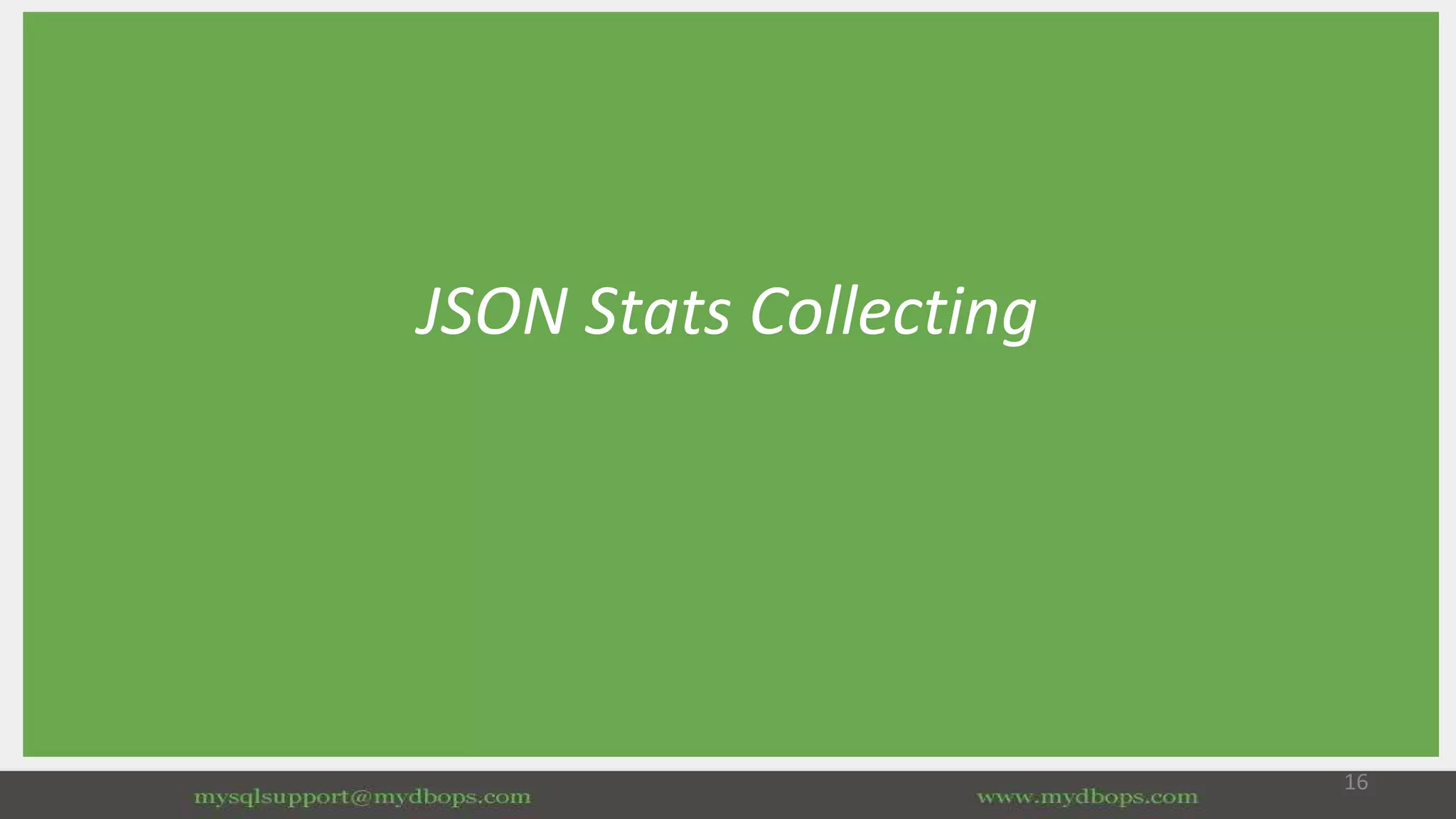
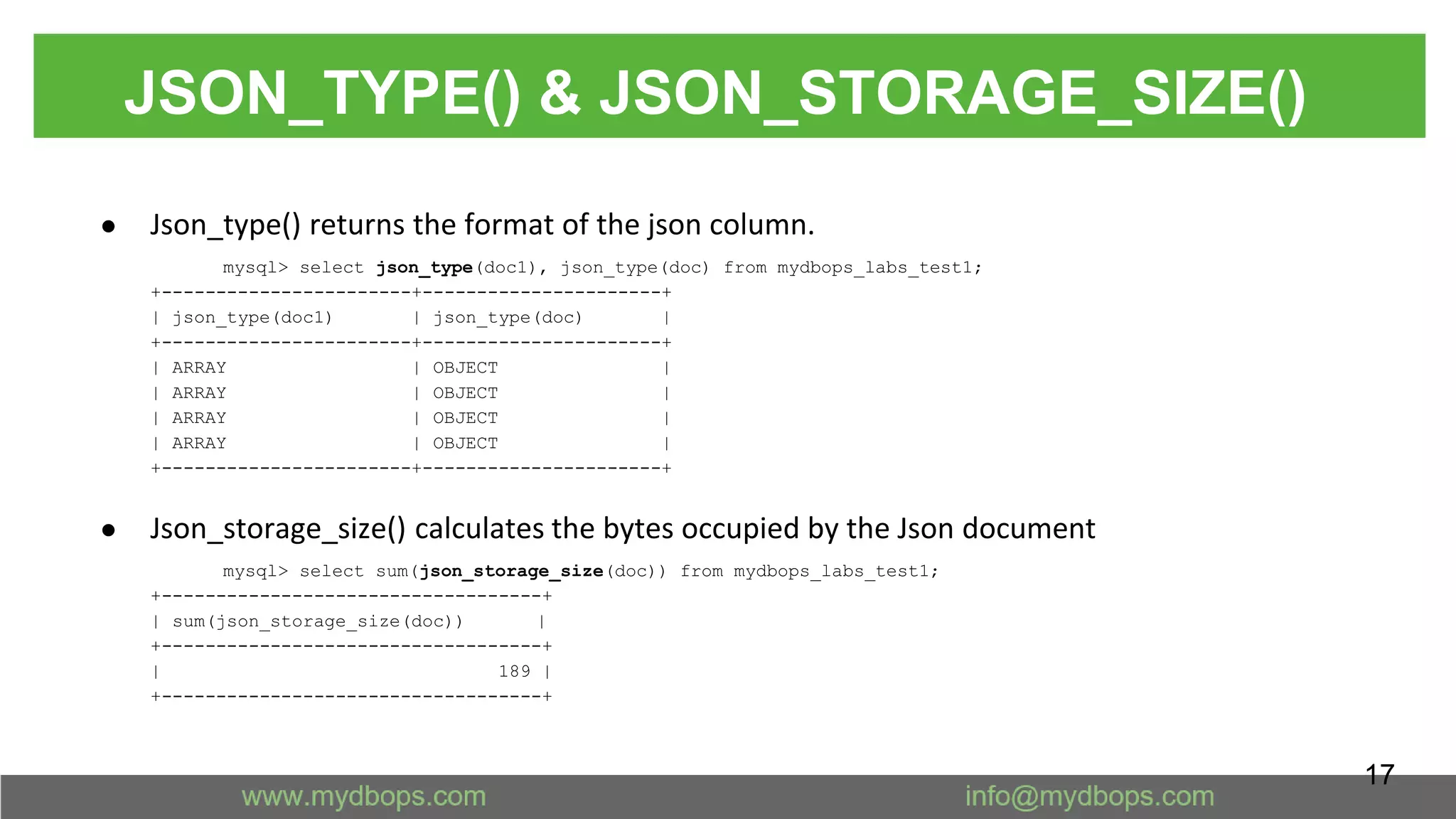

![JSON_REPLACE()
● Replace data at multiple places in the document if required. To do this, simply provide multiple
path/value pairs as required.
mysql> update mydbops_labs_test1 set doc= json_replace(doc,'$.prod_name','Air conditioner') where
json_unquote(json_extract(doc1,'$[1]'))='Third Product';
Query OK, 1 row affected (0.00 sec)
Rows matched: 1 Changed: 1 Warnings: 0
mysql> select * from mydbops_labs_test1;
+--------------------------------------------------+------+-----------------------+------------+
| doc | gen | doc1 | order_name |
+--------------------------------------------------+------+-----------------------+------------+
| {"prod_id": "1", "prod_name": "Television"} | 1 | [1, "First Product"] | Sample |
| {"prod_id": "2", "prod_name": "Speaker"} | 2 | [2, "Second Product"] | Sample |
| {"prod_id": "3", "prod_name": "Air conditioner"} | 3 | [3, "Third Product"] | Sample |
| {"prod_id": "4", "prod_name": "Bluetooth"} | 4 | [4, "Fourth Product"] | Sample |
+--------------------------------------------------+------+-----------------------+------------+
19](https://image.slidesharecdn.com/jsonimprovementsinmysql8-190226114716/75/JSON-improvements-in-MySQL-8-0-19-2048.jpg)
![JSON_REMOVE()
● Remove data at multiple places in the document if required. To do this, simply provide multiple
path/value pairs as required.
mysql> update mydbops_labs_test1 set doc= json_remove(doc,'$[0].prod_name') where
json_unquote(json_extract(doc1,'$[1]'))='Fourth Product';
Query OK, 1 row affected (0.00 sec)
Rows matched: 1 Changed: 1 Warnings: 0
mysql>
mysql> select * from mydbops_labs_test1;
+--------------------------------------------------+------+-----------------------+------------+
| doc | gen | doc1 | order_name |
+--------------------------------------------------+------+-----------------------+------------+
| {"prod_id": "1", "prod_name": "Television"} | 1 | [1, "First Product"] | Sample |
| {"prod_id": "2", "prod_name": "Speaker"} | 2 | [2, "Second Product"] | Sample |
| {"prod_id": "3", "prod_name": "Air conditioner"} | 3 | [3, "Third Product"] | Sample |
| {"prod_id": "4"} | 4 | [4, "Fourth Product"] | Sample |
+--------------------------------------------------+------+-----------------------+------------+
20](https://image.slidesharecdn.com/jsonimprovementsinmysql8-190226114716/75/JSON-improvements-in-MySQL-8-0-20-2048.jpg)
![JSON_INSERT()
● Insert data at multiple places in the document if required. To do this, simply provide multiple
path/value pairs as required.
mysql> update mydbops_labs_test1 set doc= json_insert(doc,'$.prod_name','Bluetooth','$.prod_test','Test') where
json_unquote(json_extract(doc1,'$[1]'))='Fourth Product';
Query OK, 1 row affected (0.00 sec)
Rows matched: 1 Changed: 1 Warnings: 0
mysql> select * from mydbops_labs_test1;
+-----------------------------------------------------------------+------+-----------------------+------------+
| doc | gen | doc1 | order_name |
+-----------------------------------------------------------------+------+-----------------------+------------+
| {"prod_id": "1", "prod_name": "Television"} | 1 | [1, "First Product"] | Sample |
| {"prod_id": "2", "prod_name": "Speaker"} | 2 | [2, "Second Product"] | Sample |
| {"prod_id": "3", "prod_name": "Air conditioner"} | 3 | [3, "Third Product"] | Sample |
| {"prod_id": "4", "prod_name": "Bluetooth", "prod_test": "Test"} | 4 | [4, "Fourth Product"] | Sample |
+-----------------------------------------------------------------+------+-----------------------+------------+
21](https://image.slidesharecdn.com/jsonimprovementsinmysql8-190226114716/75/JSON-improvements-in-MySQL-8-0-21-2048.jpg)
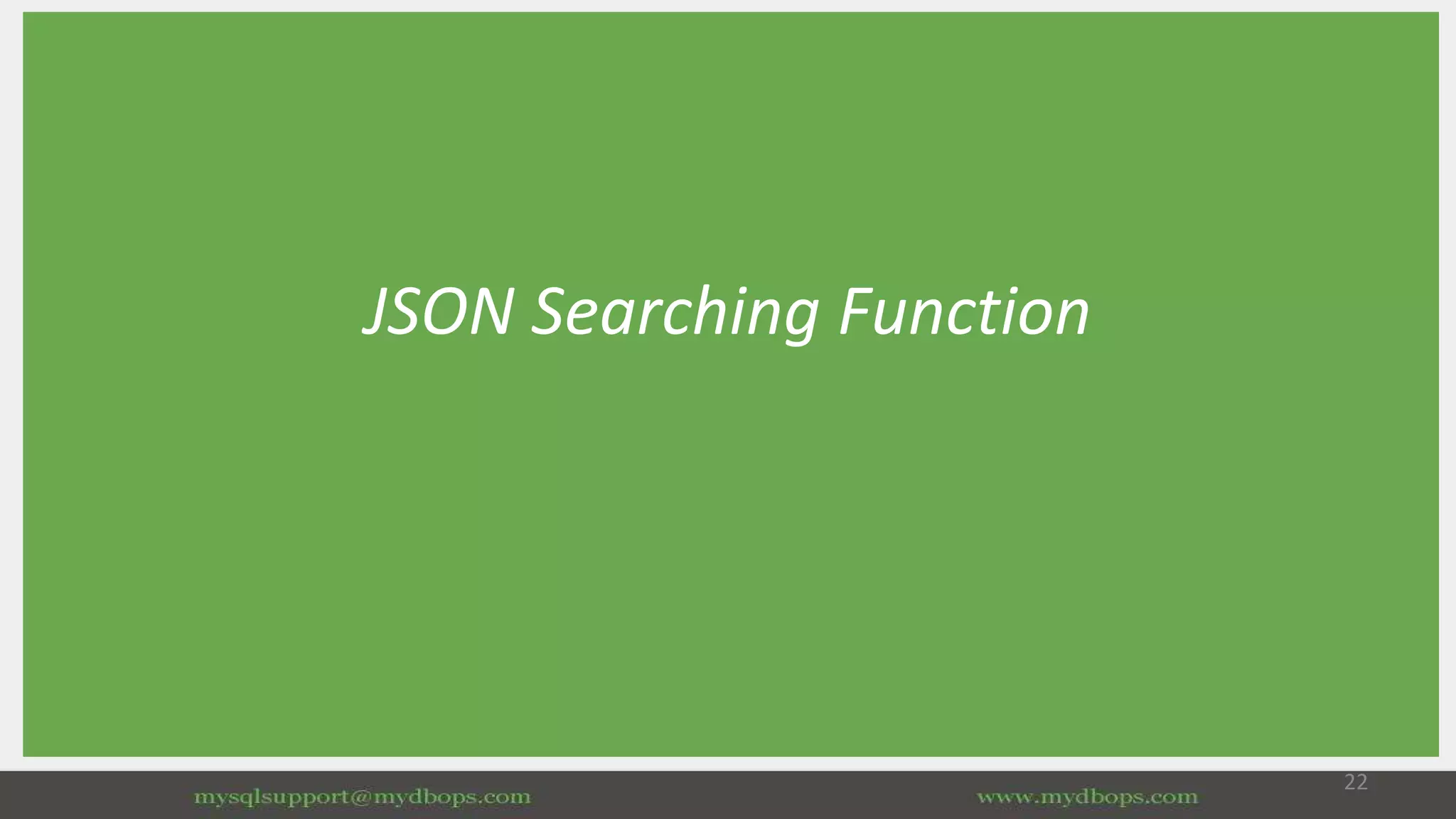
![JSON_EXTRACT()
● Used to extract the particular elements from the Json document.
ARRAY:
mysql> select doc1,json_extract(doc1,'$[1]') from mydbops_labs_test1 limit 2;
+-----------------------+---------------------------------+
| doc1 | json_extract(doc1,'$[1]') |
+-----------------------+---------------------------------+
| [1, "First Product"] | "First Product" |
| [2, "Second Product"] | "Second Product" |
+-----------------------+---------------------------------+
OBJECT:
mysql> select doc,json_extract(doc,'$.prod_name') from mydbops_labs_test1 limit 2;
+---------------------------------------------+---------------------------------------+
| doc | json_extract(doc,'$.prod_name') |
+---------------------------------------------+---------------------------------------+
| {"prod_id": "1", "prod_name": "Television"} | "Television" |
| {"prod_id": "2", "prod_name": "Speaker"} | "Speaker" |
+---------------------------------------------+---------------------------------------+
23](https://image.slidesharecdn.com/jsonimprovementsinmysql8-190226114716/75/JSON-improvements-in-MySQL-8-0-23-2048.jpg)
![JSON_SEARCH()
● Returns the position (or) path of the given search pattern.
● Search function has 2 options.
○ ONE
○ ALL
Example:
mysql> select json_search(doc,'ALL','Bluetooth') from mydbops_labs_test1; +-----------------------
-------------------+
| json_search(doc,'ALL','Bluetooth') |
+------------------------------------------+
| NULL |
| NULL |
| NULL |
| ["$.prod_name", "$.prod_test"] |
+------------------------------------------+
24](https://image.slidesharecdn.com/jsonimprovementsinmysql8-190226114716/75/JSON-improvements-in-MySQL-8-0-24-2048.jpg)
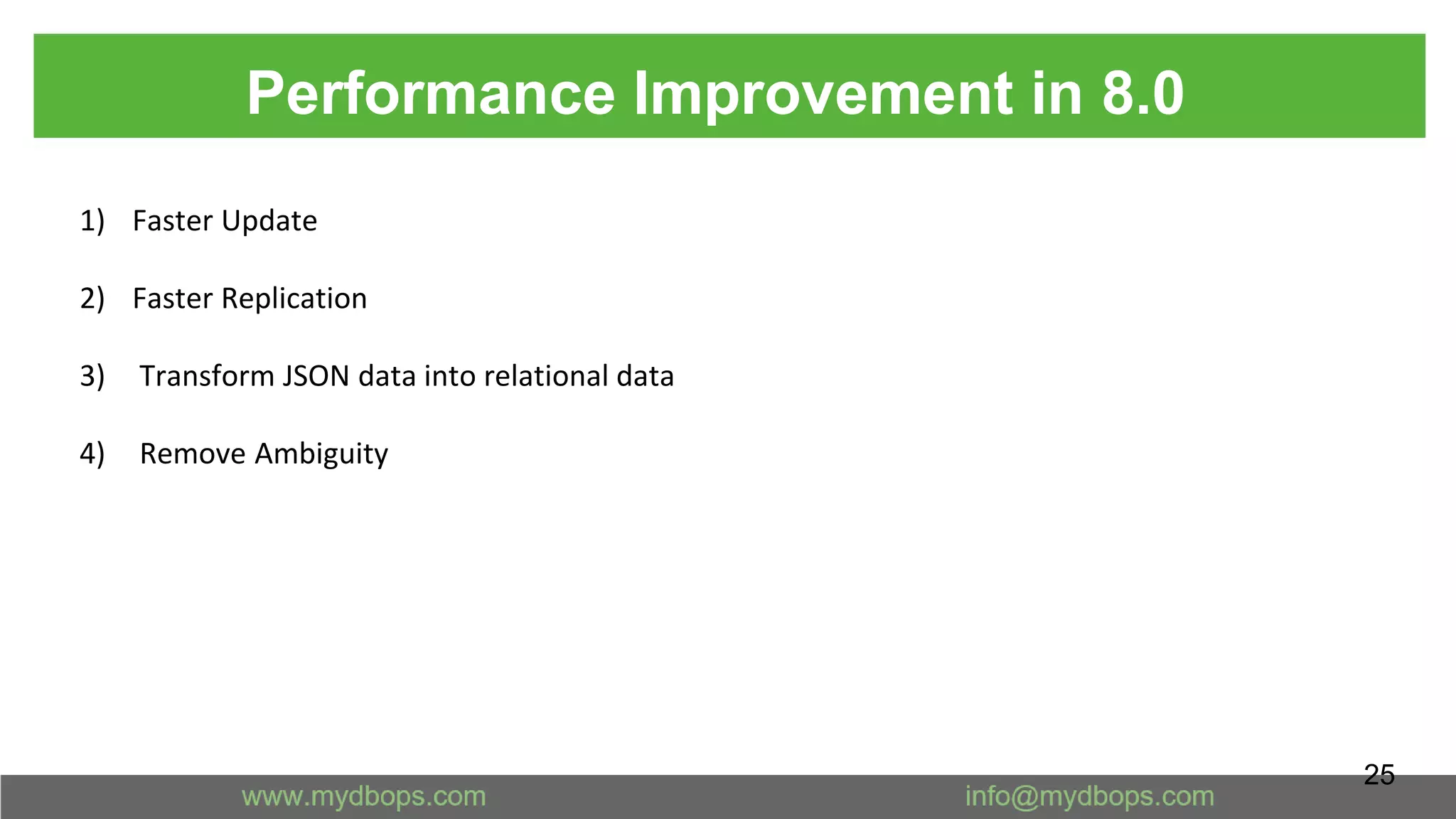
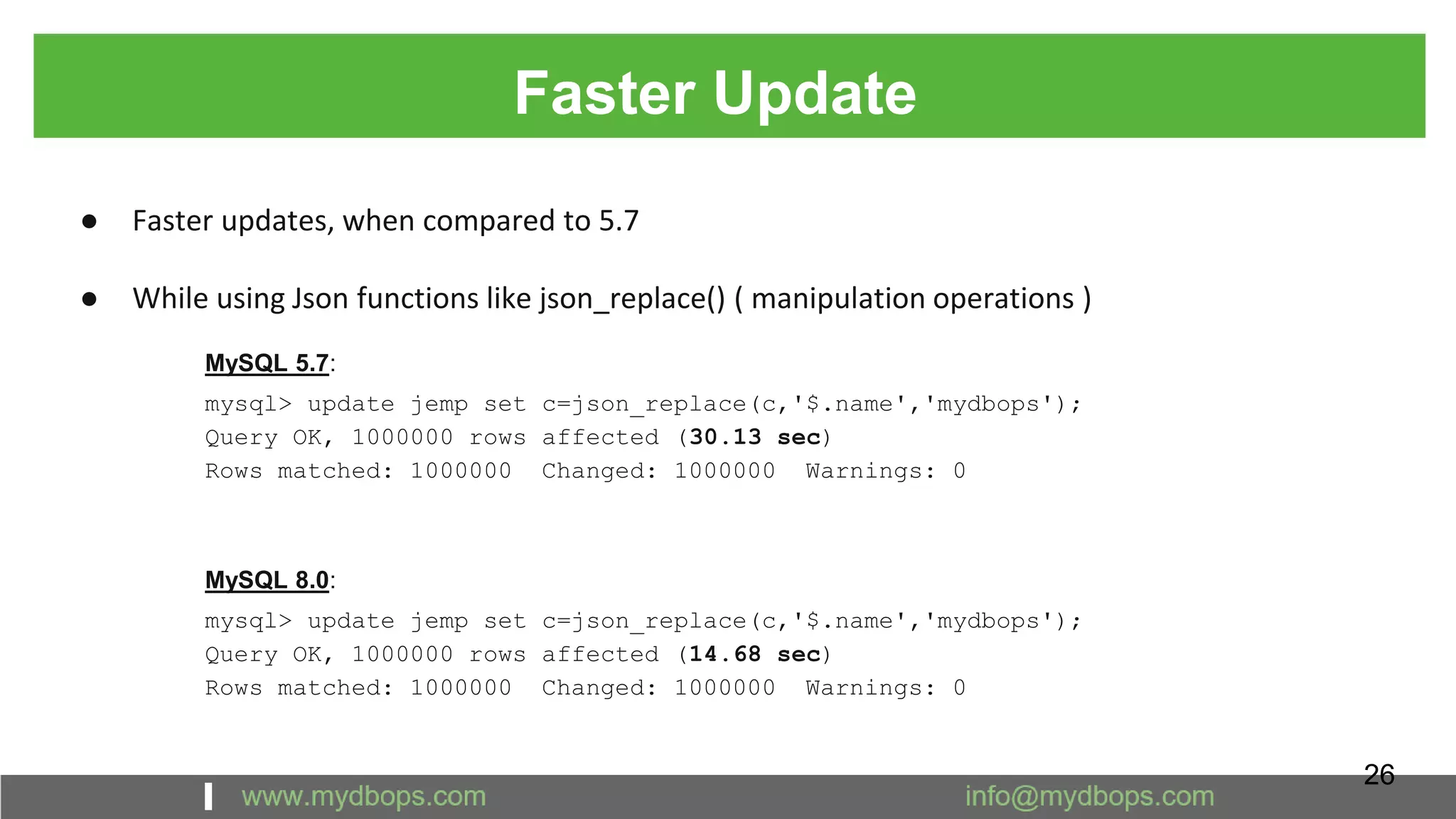
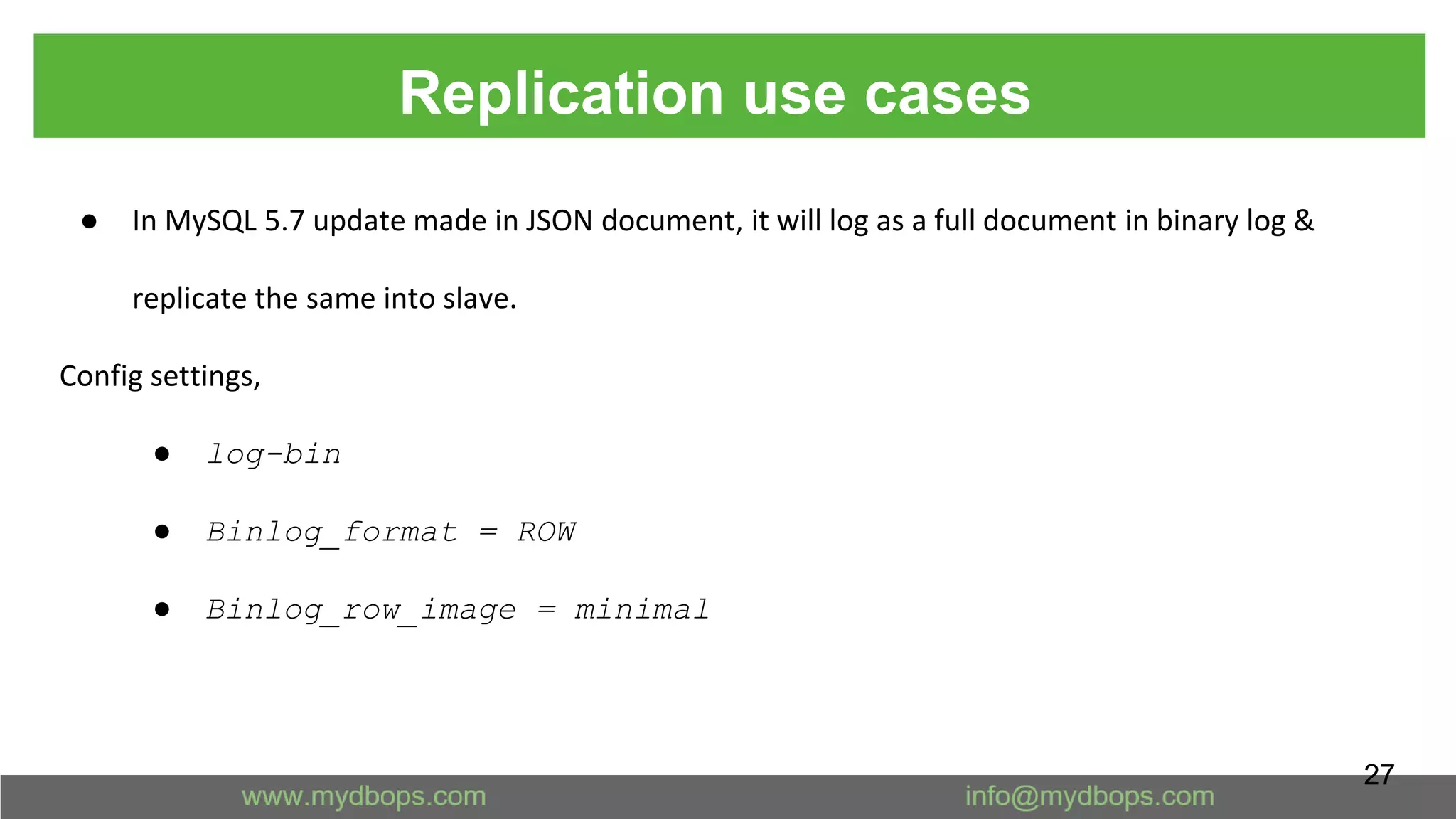
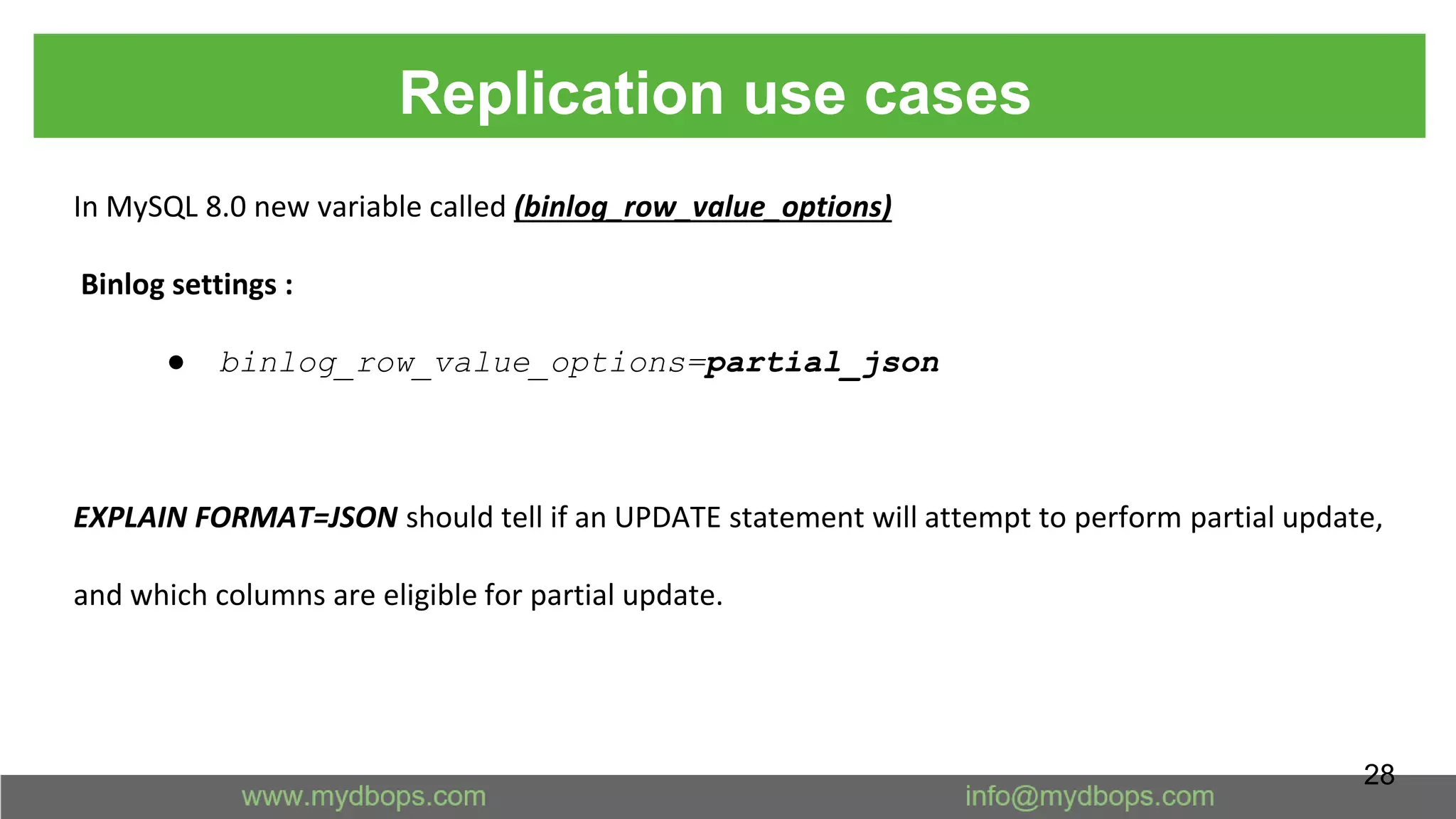
![EXPLAIN Plan and Partial Update
mysql> explain format=json update mydbops_labs_test set
doc1=json_replace(json_text,'$.prod_name','mydbops'),doc=json_replace(doc,'$[1]','mydbops')
,s_no=5G
*************************** 1. row ***************************
EXPLAIN: {
"query_block": {
"select_id": 1,
"table": {
"update": true,
"table_name": "mydbops_labs_test",
"access_type": "ALL",
"rows_examined_per_scan": 4,
"filtered": "100.00",
"partial_update_columns": [
"doc1",
"doc"
]
}
}
}
1 row in set, 1 warning (0.00 sec)
29](https://image.slidesharecdn.com/jsonimprovementsinmysql8-190226114716/75/JSON-improvements-in-MySQL-8-0-29-2048.jpg)
